#this is just him being mean getting punished arbitrarily and not learning anything
Text
the thing about yosuke’s shittiness around here (up close and personal, the campout) is that the vast majority of it isn’t doing literally anything for his character. i completely think yosuke’s shittiness is important to his character, but it’s by and large reflections of his own insecurities and flaws. he’s insecure about his masculinity and sexuality, he’s lame, he’s selfish, he’s obsessed with the idea of women, his mouth moves faster than his brain, he doesn’t like himself, and he cares way too much about the societal ideal of ‘normal’. but it’s really important that he’s self-aware! he knows when the things he says are shitty, he knows he’s lame, he knows he’s selfish, he knows he’s putting up a front of being carefree and normal. but there’s absolutely no self awareness here, there’s no recognizing he went too far and apologizing the next day, there’s no regret, there’s not even any self-deprecation, and there’s absolutely no compassion or empathy like he has in serious moments. a lot of what he says is just mean for meanness’s sake, in an execution incongruous with previous behaviour. it’s not even funny!
#tbh i think the thing with kanji in the tent was the closest to being interesting#like by the end he’s warning against kanji leaving the tent#so clearly he cares about kanji more than he’s homophobic#he was straight up just saying that stuff to be shitty. knowingly!#that’s interesting! and the whole thing reeks of yosuke’s own insecurity in his masculinity and sexuality#he took it way too far and i deeply wish he’d quit it with the we statements#but if he had even a single line like ‘shit… i shouldn’t have said all that’ or recognized he was in the wrong at all#then i think it genuinely would’ve been an important moment for his character#everything else was just extremely shitty for no reason. the fucking swimsuits was pathetic but the gross guilt tripping was awful#he’s just lacking all of his usual self awareness. he’s lacking all of his good qualities and nuance#like it’s a fundamental misunderstanding of what makes yosuke’s other moments interesting or funny#this is just him being mean getting punished arbitrarily and not learning anything#on paper i get it. i get how these events could be continuations of established charateristics#but it’s just so mean and shitty that it becomes absurd nonsensical and unenjoyable#the stuff with hanako is just genuinely repugnant on the game’s behalf. it serves no purpose other than cruelty#definitely the worst part of the game so far#rambles#p4g posting#yosukeposting
37 notes
·
View notes
Text
"The North Korean regime in the ‘50s developed a series of remarkably effective torture techniques, techniques that were so effective, in fact, that they were able to make captured American airmen admit to all sorts of atrocities they had not in fact committed, all the time, being convinced they had not, actually, been tortured. The techniques were quite simple. Just make the victim do something mildly uncomfortable—sit on the edge of chair, for example, or lean against a wall in a slightly awkward position—only, make them do it for an extremely long period of time. After eight hours the victim would be willing to do virtually anything to make it stop. But try going to the International Court of Justice at The Hague and tell them you’ve been made to sit on the edge of a chair all day. Even the victims were unwilling to describe their captors as torturers. When the CIA learned about these techniques—according to Korean friends of mine, they’re actually just particularly sadistic versions of classic Korean ways of punishing small children—they were intrigued, and, apparently, conducted extensive research on how they could be adopted for their own detention centers.
Again, sometimes, in Palestine, one feels one is in an entire country that’s being treated this way. Obviously, there is also outright torture, people who are actually being shot, beaten, tortured, or violently abused. But I’m speaking here even of the ones that aren’t. For most, it’s as if the very texture of everyday life has been designed to be intolerable—only, in a way that you can never quite say is exactly a human rights violation. There’s never enough water. Showering requires almost military discipline. You can’t get a permit. You’re always standing in line. If something breaks it’s impossible to get permission to fix it. Or else you can’t get spare parts. There are four different bodies of law that might apply to any legal situation (Ottoman, British, Jordanian, Israeli), it’s anyone’s guess which court will say what applies where, or what document is required, or acceptable. Most rules are not even supposed to make sense. It can take eight hours to drive 20 kilometers to see your girlfriend, and doing so will almost certainly mean having machine guns waved in your faces and being shouted at in a language you half understand by people who think you’re subhuman. So you do most of your dalliance by phone. When you can afford the minutes. There are endless traffic jams before and after checkpoints and drivers bicker and curse and try not to take it out on one another. Everyone lives no more than 12 or 15 miles from the Mediterranean but even on the hottest day, it’s absolutely impossible to get to the beach. Unless you climb the wall, there are places you can do that; but then you can expect to be hunted every moment by security patrols. Of course teenagers do it anyway. But it means swimming is always accompanied by the fear of being shot. If you’re a trader, or a laborer, or a driver, or a tobacco farmer, or clerk, the very process of subsistence is continual stream of minor humiliations. Your tomatoes are held and left two days to rot while someone grins at you. You have to beg to get your child out of detention. And if you do go to beseech the guards, those same guards might arbitrarily decide to hold you to pressure him to confess to rock-throwing, and suddenly you are in a concrete cell without cigarettes. Your toilet backs up. And you realize: you’re going to have to live like this forever. There is no “political process.” It will never end. Barring some kind of divine intervention, you can expect to be facing exactly this sort of terror and absurdity for the rest of your natural life."
-David Graeber, Reflections from a Visit to the West Bank
148 notes
·
View notes
Text
Restless Rewatch: The Untamed Ep 17 part one
(Masterpost of all the rewatches) (Canary’s pinboard of original content)
Warning: Spoilers for All 50 Episodes!
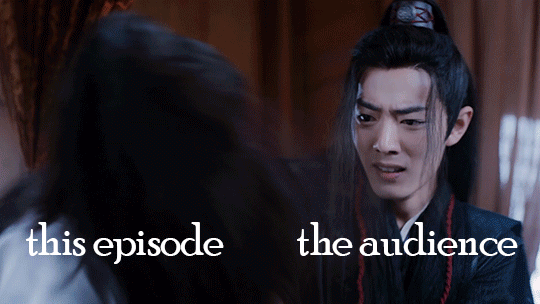
Inaccessible
Wei Wuxian hides in a boat among the lotuses next to a pier in Lotus Pier, the second-most-literally-named home in the show, after The Burial Mounds. This pier has a railing that goes all the way around it, without any ladders or anything. Not to be ADA on main but this means if you can't Jedi jump, you're fucked.

Hefeng Liquor
While Wei Wuxian waits and tries, not very successfully, to keep his shit together, he hears the guards talking about the local booze that they're going to drink at their murder victory party. We learn, in a desaturated flashback (that OP has done her best to resaturate), that this is lotus-infused wine invented by Wei Wuxian during happier days.

He kicks the flashback off with his favorite activity, Unnecessarily Erotic Beverage Drinking. (gifset) I’ve slowed this gif down so we can all appreciate the unnecessariness. The way his hand caresses that leaf OMG

Hopefully he is not drinking lake water out of that leaf. Side note: How is it possible that Xiao Zhan doesn't have a drinking water endorsement deal? I had to resort to Zhu Yilong's brand of water for this gag. I figure if it's good enough to pour directly onto a lightning burn like they do in The Lost Tomb Reboot, it's good enough for a leaf hummer chastely drinking out of a leaf
(more behind the cut!)

In his memory, Jiang Cheng tells him to stop fucking around and come help with the basket of lotus pods. Wei Wuxian responds by grabbing one for himself and then sitting his ass down and not helping. Cause he’s a motherfucking P.I.M.P.
Emotional Rescue
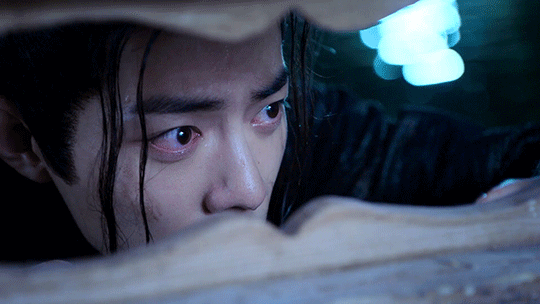
Wen Ning arrives on the pier with Jiang Chang, to Wei Wuxian's extreme relief. Look how much emotion Xiao Zhan is able to convey even with half of his face hidden, my lord.
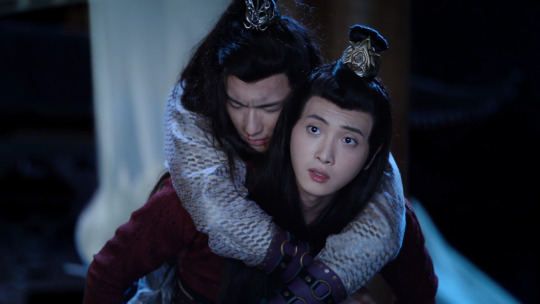
Wen Ning carries Jiang Cheng on his back, in an echo of other significant piggyback rides in Wei Wuxian's life.

Wei Wuxian's relief is at war with his fear, seeing his brother in such bad shape. Remember, these are cultivators, who heal quickly and mostly don't get their asses beat this hard. The only time Wei Wuxian has been comatose was after the Xuanwu cave, and that was probably because of his prolonged contact with resentful energy/Yin iron.
Hibernating Zidian
Wen Ning gets ready for his first, but not his last, boat ride with an unconscious Yunmeng brother in it. He tells Wei Wuxian that Jiang Cheng is pretty fucked up but isn't dead.
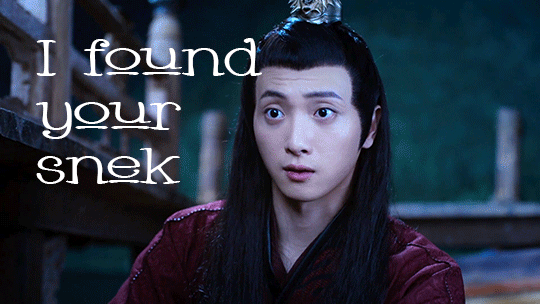
Then he gives Zidian to him. Before we talk about Zidian, let's talk about BAMF Wen Ning. Wen Ning is an awkward goofball. He’s also insanely competent at just about everything--wine-drugging, dude-smuggling, corpse retrieval, dog acupuncture, drug pushing. As well as shooting rocks out of the air and, later, beating zombie ass, and resisting mind control. .
This is the foundation of their friendship; it’s not actually about Wei Wuxian being nice to the weird kid. He initially sought Wen Ning out for the same reason he sought out weird kid Lan Wangji--his martial skill. He accepts his weirdness and is protective of him because of his missing-spirit problem, but he did not befriend him out of altruism.
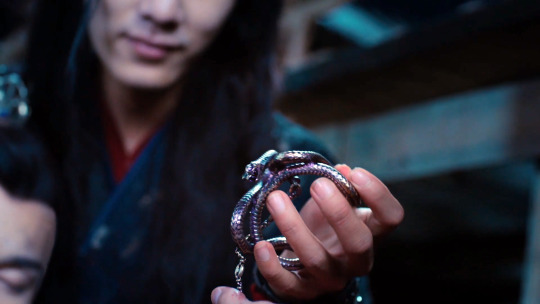
Wei Wuxian is so forgiving that he can smile fondly when looking at the weapon that whipped the shit out of him a couple of days ago.
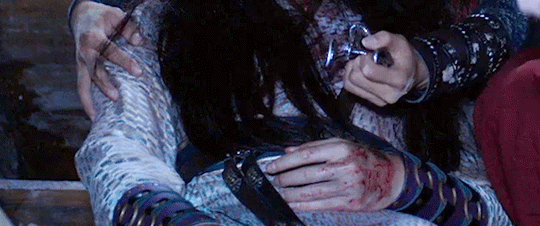
Wei Wuxian puts Zidian down right next to Jiang Cheng's hand and...nothing happens. It doesn't recognize him or spark to life. This didn't seem meaningful when I watched it the first time, but rewatching...yikes. It KNOWS.
Wei Wuxian admits, with tears in his eyes, that there is nowhere safe for him to go with Jiang Cheng, and Wen Ning immediately offers care and shelter. Even though that is putting his own life at serious risk.
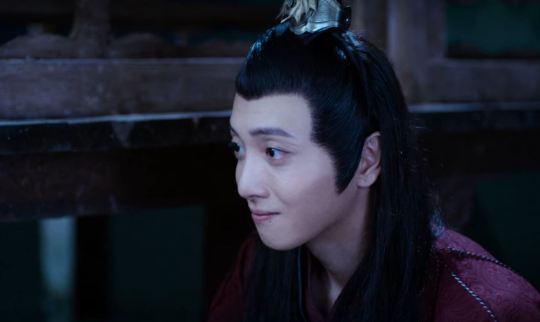
Life obligation is a common theme in CDramas. It’s often something a person chooses as a way of showing love. Guardian builds an eternal romance out of two people saving each other’s lives over and over. But accepting the obligation is a choice (in fantasy dramas, if not in real life). Love and Redemption has a gloriously harsh sequence where a life is saved, and the save-ee cooly rejects the saver.
Every time Wen Ning saves Wei Wuxian, he cites that one time that Wei Wuxian saved him from the water demon. And Wei Wuxian cites this rescue right here when he throws everything away to save Wen Ning. Meanwhile, Jiang Cheng doesn't acknowledge any debt to Wen Ning at all, only--grudgingly--to Wen Qing. And people are ok with that.
Basically all this is to say that I think Wen Ning leans into this life debt because he loves Wei Wuxian, and Wei Wuxian leans into it because he loves him back. Non-romantically, I think...at least on Wei Wuxian’s part. YMMV.

They go to pick up Yanli from their Granny, telling her to go into hiding. She starts to cry, not knowing how she'll manage on her own. Wei Wuxian tells her that they will come back, as Wen Ning looks super unsure about that.
Of course Wei Wuxian can't know, at this point, whether they will come back. Wei Wuxian always wants to make everybody feel better, and sometimes you really can't make someone feel better except by lying. He compulsively says shit that he thinks people want to hear, almost as if he was beaten frequently and arbitrarily as a child.

Wen Ning is doing his best for the recreational boat ride industry, as he rows the Yunmeng trio through some amazingly beautiful scenery.
Core Melting Time
Meanwhile, back at Lotus Pier The Yunmeng Supervisory Office, Wen Chao is hung over, Wen Chao is angry, Yawn
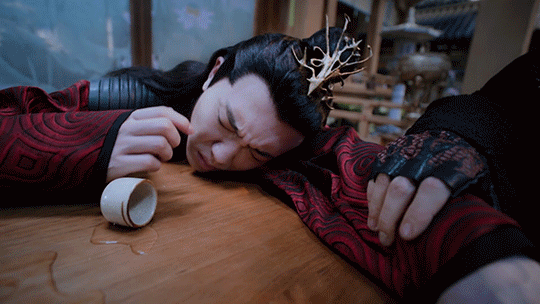
For some reason, Wang Lingjiao has suddenly decided to talk to Wen Chao in the most cloying and annoying way possible.

Also, the fact that she still addresses him as Gongzi when she is totally fucking him is kind of great. This is like those fics where Elizabeth Bennet calls Mr. Darcy "Mr. Darcy" even when they're married and hitting it.
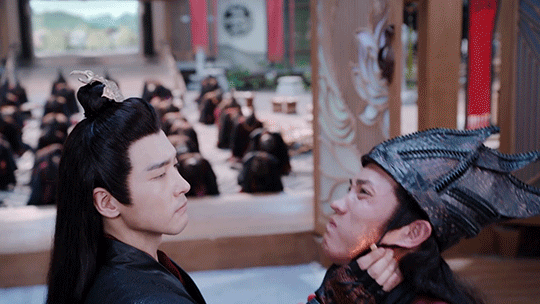
Wen Zhuliu demonstrates why he's called Core-Melting Hand, by punishing the wine guard. He's able to melt a guy's core by grabbing him by the throat, and also picks him up, Darth Vader style, for extra meltyness.

All that stuff I said last time about Wen Zhuliu feeling ambivalent about being a villian...yeah, he seems to have gotten that right out of his system.
Chilling in Yiling
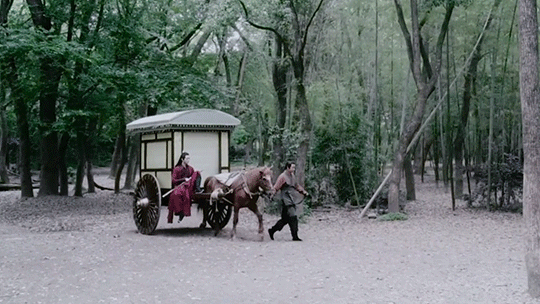
Wen Ning is doing his best for the recreational carriage ride industry. Wei Wuxian, after presumably several hours in the cart, decides that now is a good time to get curious about where they are going.
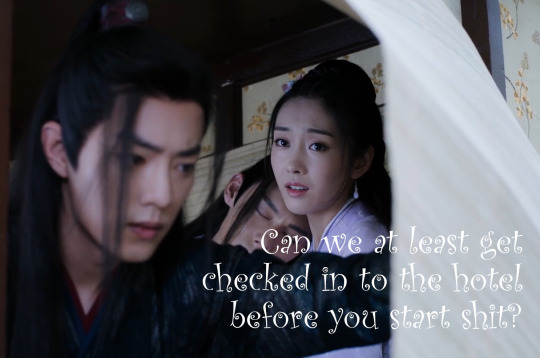
Here we start to see a new side of Wei Wuxian. Before this he was carefree, other than specific worries about his friends. He confronted danger with lightness and humor, or with temporary fear, that he let go of once the danger passed. Now, after all the deaths and seeing Jiang Cheng so injured, he's twitchy, anxious, and angry.
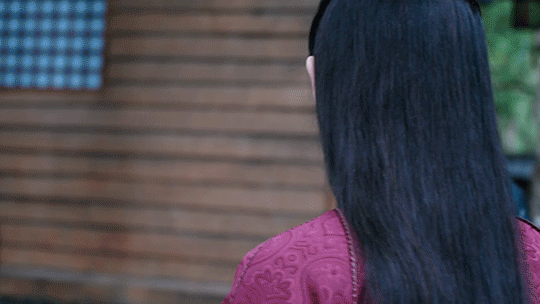
Very, very angry.
When he realizes that Wen Ning has brought them to the Yiling supervisory office, he goes off, demanding to know whose home this was before the Wens took it and grabbing Wen Ning and shoving him into a decorative...decoration. He thinks Wen Ning brought them here to harm them.

I wouldn't have thought such a pretty dude could be so menacing, but holy crap.
The way he's confronting Wen Ning here is not his normal style. He's not trying to provoke a bigger fight like he usually does; he's not trying to create distance, the way Jiang Cheng does. He's very intimate, getting right in his face and maintaining eye contact. He trusted Wen Ning and feels personally betrayed.
Shy little Wen Ning is remarkably calm when confronted like this. Wen Ning really isn’t afraid of anything, despite his general air of nervousness. (Full gifset of Angry WWX over here.)

He calmly and kindly explains the situation. He doesn't appeal to Wei Wuxian's trust, saying "oh I would never;" he appeals to his logic, which gets through to him.
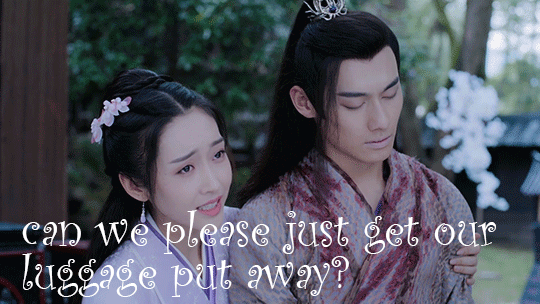
Wen Qing comes out and the guards start banging on the door and Wei Wuxian flips out again, grabbing a sword and pointing it at Wen Qing as she decides what to do. Wen Qing seems unruffled by Wei Wuxian's sword pointing, and we see her weighing up the situation.

She makes her decision, sending the guards away and deciding to help the fugitives, officially joining the Clear Conscience Club. She could probably get Wen Ning out of trouble by turning them in, but she opts to put personal loyalty and her belief in her own ideals ahead of her family's safety.
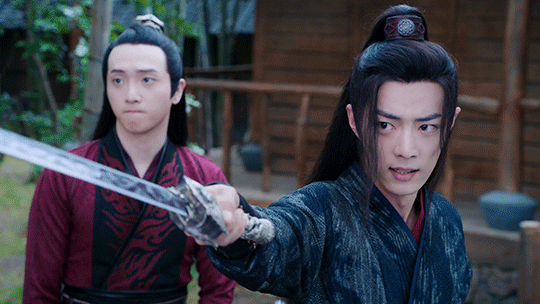
Wei Wuxian is not ok. He’s just not ok. He tries to act like it after they get settled in with Wen Qing, but he's not, and I think that plays into his next several choices.
Next comes a whole sequence of Jiang Cheng being unconscious with pins in his head--ow--while Wei Wuxian twitchily tends to him.
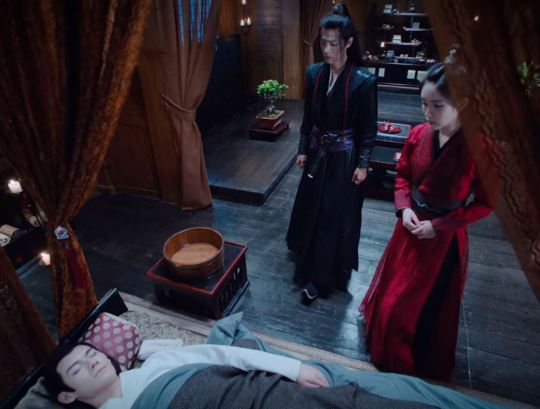
This sequence is kind of unfair to Jiang Yanli. What matters to the story here is Jiang Cheng and Wei Wuxian's relationship, so that’s the focus of these scenes. But really, there is no way Jiang Yanli would not be at Jiang Cheng's side unless she was literally unconscious herself. Let's assume Wen Qing stuck a needle in her to make her rest while she has a fever. Shippers should also feel free to assume that Wen Qing spent hours at her bedside, tenderly wiping her forehead and holding her hand as she recovered.
In his sleep, while Wei Wuxian sits by his side, Jiang Cheng calls for his sister, mother, and father, but not for his brother. Ouch.

Let's pause to appreciate Wei Wuxian's new outfit, which is the sort of getup most people in this society probably imagine Yiling Laozu wearing, rather than the low-key homespun stuff he actually spends his Yiling year in. This robe has fancy shoulders, shiny material, touches of Jiang purple, strange red hoody strings, and a fuckin' CAPE. He didn't bring any luggage with him from Lotus Pier, although he's still got his Yin Turtle Sword hidden in a bag of holding. So the most likely explanation is that Wen Ning hooked him up with this lewk. "Wei Wuxian is a nice person. He should have a magnificent cape."
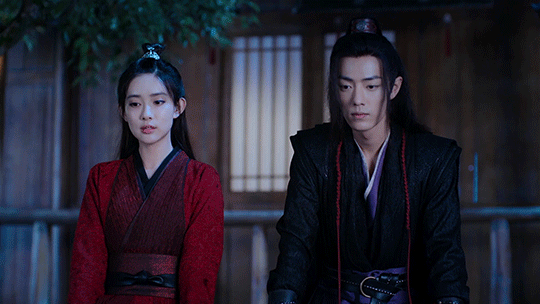
Wen Wing and Wei Wuxian take a breather to stand on the porch and work out what their status is with each other, like a couple of fucking adults, which is amazing. Basically Wei Wuxian is ready to forget earlier Wen shenanigans, but is going to avenge Lotus Pier.

Wen Qing isn't enthusiastic about that but doesn't argue, just asking, mostly rhetorically, if he plans to kill her too. He's uncomfortable considering that; the role of avenger isn't one that's comfortable for him, although he turns out to be extremely good at it. He does not, of course, plan to kill her too. In a few months, imprisoned in a Wen dungeon, she will be the only Wen left alive after Wei Wuxian 1.5(No-Gold Edition) and Chenqing come to visit.
Jiang Cheng finally wakes up, and the first thing he does is to test out his spiritual power by hitting Wei Wuxian as hard as he can.
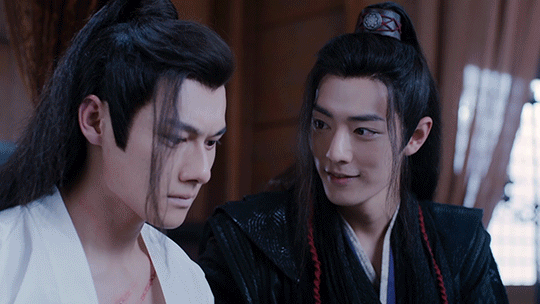
DUDE.

Look at Wei Wuxian's face, as he goes from happy, to shocked and hurt, to laughing it off. It's exactly like when Jiang Cheng shoved him in the Rock Lady temple. Has Wei Wuxian spent all of his years with Jiang Cheng going from affection, to hurt feelings, to pretending it's fine? God, I think he probably has.

This episode raises a question that will come up again later, but never be answered. That question is, what the fuck are these weird footies and why the fuck does Jiang Cheng wear them to bed?
Jiang Cheng reveals that his golden core is gone, that he can't cultivate any more, which means he can't avenge his parents or achieve any ambitions in life. Nobody has apparently given any thought to why Wen Zhuliu is called "Core-Melting Hand" before this, which is hilarious, frankly. If I fought with a guy called, for example, Brain-Eating Mouth, I think I would make certain assumptions about him and what he planned to do with my brain.

Something interesting is happening in this moment, because as he comes fully back to consciousness, Jiang Cheng pours out all of his trauma and horror to his brother, telling him about the core melting and practically wailing about his feelings over it all. And his brother understands, and ultimately finds a way to help him. What does Wei Wuxian do after his own trauma? Keeps it secret, so nobody finds a way to help him, although many people try to. So Jiang Cheng is, in this way at least...emotionally healthier than Wei Wuxian? That's unexpected.
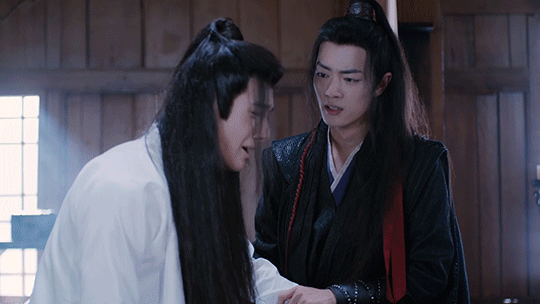
Jiang Cheng is super upset and is mad at eternal scapegoat Wei Wuxian for saving him. Jiang Cheng would rather be dead than be a regular person. Whereas Wei Wuxian, faced with the same problem, is like, *shrug* I’ll adapt. These are both valid emotional responses to suddenly becoming disabled. Losing a golden core is definitely a disability, in this environment; it's not just about magic sword fights. Jiang Cheng's home is designed for people who can fly; Lan Wangji's home is designed for people who don't feel cold, and Wen Central is made of actual lava, for example.
Jiang Cheng is already struggling with a lot of difficulties. He was raised by shitty parents, he's got anger management issues, he has a crushing weight of responsibility. And now he's also lived through the deaths of most of the people who matter to him. If sword cultivation is the one thing that gives him joy in life (ok one of two things, obviously fashion also gives him joy because he WORKS it), he can't reasonably be expected to rally when it's taken away.
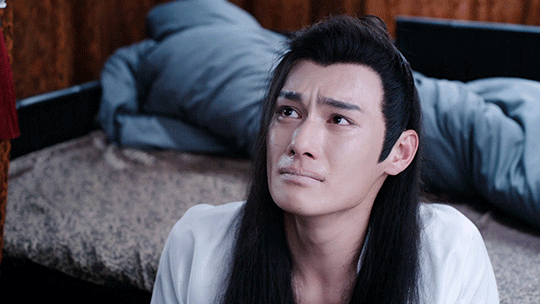
Oh, honey. Oh, baby boy.
Wen Qing picks the worst moment to come in and tries to tend to Jiang Cheng, who starts off being devastated that the girl he likes is seeing the wreck he's become, and then moves along to helpless rage when he remembers that she's a Wen, and he screams at her to get out.

Jiang Cheng is not able to put personal loyalty ahead of clan loyalty like Wei Wuxian is. Partly this is his nature, and partly it's his role as the lineal descendant of the clan leader. As a firstborn son of a gentry family, his destiny as clan leader is in his blood, and so is his responsibility to the clan. When Wei Wuxian praises Song Lan and Xiao Xingchen for caring less about bloodlines than about shared ambition, he is speaking from the position of someone who's bloodline ain't shit. Jiang Cheng will never be able to share that perspective.
Next: More of this excruciating episode!
Writing prompt: The Day I Discovered I Could Melt Your Fucking Core, by Wen Zhuliu
Drabble prompt: Why I Wear Socks to Bed, by Jiang Cheng
#fytheuntamed#the untamed#the untamed gifs#wei wuxian#jiang cheng#wen qing#wen ning#restless rewatch the untamed#canary3d-original#my gifs#the untamed spoilers
306 notes
·
View notes
Text
The Tower: Happily Ever After - 2

The Tower: Happily Ever After
An Avengers Fanfic
Series Masterlist | Character Refrence
PREVIOUS //
Pairing: Avengers x OFC, Bruce Banner x Bucky Barnes x Clint Barton x Wanda Maximoff x Steve Rogers x Natasha Romanoff x Tony Stark x Thor x Sam Wilson x OFC (Elly Cooper)
Word Count: 1849
Warnings: Pregnancy and minor language on chapter.
Synopsis: Almost 40 years after Elise Cooper first crashed into Natasha Romanoff outside the library at Columbia University, she and the Avengers are adapting to a near-immortal life together with their large brood of children. Yet things aren’t perfect. Life is moving on without them and they’re starting to discover who isolating being immortal can be.When Angela comes and asks Thor to take the throne of Asgard once more, the group leaves Earth in the hopes that they will find their Happily Ever After there.

Chapter 2: Anger Issues
When Marya returned home from school that day we were all ready to meet her. Marya was sixteen years old, a little taller than I was, with dark hair and light brown eyes - just like Bruce. Those weren’t the only things she’d inherited from her biological father. She was extremely intelligent and had been skipped ahead a grade in school. There had been talk about skipping her ahead more than that, but it wasn’t something encouraged in schools due to the strain it has on children’s emotional and social development. So instead she was finishing up high school with her peer group while taking college courses as electives.
She also had her own little green problem.
Her powers worked differently from Bruce’s. She could turn into a hulk, and that transformation could be triggered by extreme negative emotions - not just anger, but when she was really sad or anxious too. Unlike Bruce though, she never had to worry about sharing her body with another person. When she changed she was always herself and generally she had such precision control over the transformation that she could do it on command, much as Bruce could after the bonding ceremony all those years ago.
She looked around suspiciously at us as we called her over to the couches by the large window, typically the place where we had family meetings. It was usually where we spoke to the kids if they had done something they probably shouldn’t have. We took an approach with our parenting where they didn’t usually get in trouble for misbehaving. Rather we tried to think of a real-world consequence for what they’d done. For example, if they were fighting they had to sit down and listen to each other’s grievances and then work out a way to both come to an understanding about how the other feels and try to make each other feel better. It didn’t always work, but we figured it was better than arbitrarily making them go sit in the corner. So it made sense that she’d think she was in trouble for something.
“What’d I do?” She asked, dropping her backpack on the ground while she stood looking at her gathered parents.
“Why don’t you tell us?” Sam teased. “And we’ll tell you if that’s it.”
“I’m not falling for that,” Marya snarked, folding her arms across her chest.
“Honey, sit down,” Steve said, gently. “You’re not in trouble. We just need to tell you something.”
Marya sat down carefully, looking at everyone with deep suspicion. “Is someone else pregnant? Are you trying to populate Earth with just our family?”
“No,” Clint laughed. “What the hell?”
I rolled my eyes. “Honestly, honey, I sometimes think the same thing,” I said. “But that’s not what this is.”
“Your Aunt Angela came to visit today,” Steve explained. “She’s giving up the throne of Asgard.”
“Does that mean Riley’s going to be queen?” Marya asked, looking over at Thor. “I can’t believe my sister’s going to be the queen of a whole other planet.”
Thor shook his head. “Riley is still too young to rule by Asgardian standards. My people - our people - would consider that the equivalent of having Zak as their king. I have to step up and take the lead.”
“Which means, we are moving to Asgard,” Steve finished. “I know that...”
“What?” Marya yelped, interrupting Steve as she blinked at us. “When?”
“Within the month,” Steve said.
“But I have school!” Marya shouted. Her fists clenched and she started to turn green at the edges. “And what about my friends? You can’t just take me away from everyone I ever knew!”
“Mar,” Bruce said, gently. “Deep breath. Get that under control.”
“Don’t tell me how to feel!” Marya shouted, slamming her hands on the coffee table and sending a large crack through the heavy wood. I jumped a little, startled at her violent reaction, and the green started to creep into her arms starting at her hands, making her muscles swell and double in size.
Sam moved forward and crouched in front of his daughter, taking both her hands in his and looking into her eyes. “Marya,” Sam said with a gentle yet commanding tone. “I know you’re upset, but you need to talk about this rationally. If you can’t talk about it, you’re gonna have to go to your room to cool off first.”
She started crying and pulled her hands out of his. “It’s not fair!” She cried. “I don’t even get a say about whether or not you take me away from my friends. My whole goddamn planet?”
“Honey,” Steve said, wrapping his arm around Marya’s shoulders. “I know this is tough. I really do. But we’re partially doing it for you.”
“I don’t see how taking me from my friends is somehow supposed to be good for me,” she grumbled.
“Alright, kid,” Natasha said. “I’m going to give you some harsh truths here. You’re going to lose them anyway. Maybe not all of them anytime soon, but the ones you would have kept in your life you’d have had to watch age and die. Just like we all have done and are with our friends and family. We want to save you what’s happening with Rose. We don’t want you to have to fall in love and then watch them fade out while you’re stuck looking like you can’t buy a beer.”
Marya started crying harder and fell into Steve’s side and Wanda glared at Natasha. “You didn’t have to be so harsh,” Wanda snapped.
“Well babying her wasn’t doing it either,” Natasha argued. “She needs to hear it. She might not like it, but going to Asgard is what’s best for her.”
“Can’t I even finish school?” Marya begged. “I could stay with Eddie - or Rose. Or one of my friends. And then… then I’ll come.”
“There will be school for you on Asgard,” Thor said. “And it will teach you things that far outreach anything any of you have learned on Midgard. Riley and Pietro both attend and they learn of the world tree, and alien languages, advanced mathematics, and magic. You are already holding yourself back to fit in, daughter. You would never have to hide any part of you in Asgard. Not your intelligence, and not this -” he tapped her arm where it was still tinged with green.
“And I’ll make it so you can talk to your friends here. We’ll set up a line of communication,” Tony added. “Don’t worry. I’ll make sure my kids don’t go without Tumblr and Instagram. Imagine how many followers you’ll get posting selfies in Asgard.”
“I already have a tonne of followers, dad,” Marya sniffed. “I’m a Skjodbærer.”
“Yes, you are,” Tony said. “And don’t you forget it. The whole universe is yours.”
“We’ll make sure we come back to visit,” I said. “We all still have friends here, and places we like to spend our time.”
“Yeah, who’s going to annoy Katie-Kate if I’m not around?” Clint joked.
Marya let out a small laugh that was still more tears than actual laughter. “I’m sure she’d hate not being annoyed by you.”
“Yeah, that’s right,” Clint said and patted Marya on the thigh.
“We aren’t doing this to punish you, Mar,” Sam soothed. “I promise. We’ve all been talking about this for a long time, and we were going to wait, but your dad can’t anymore. He has to go and rule his kingdom. And sometimes we have to give up what we want to do for what we need to.”
Marya let out a long slow breath and nodded. “I know. I know, dad. They’re still my friends though and I’m still sad about it.”
“I know,” Wanda said. “Being sad is normal.”
“Can I have a goodbye party?” Marya asked.
“Look who you’re talking to,” Tony teased. “The biggest.”
She sat silently for a moment and nodded again. “If I really hate it, can I come back again?”
“You need to give it a proper chance,” Steve said.
“I will,” she assured him. “I just… I don’t…”
“If you really hate it, you can come back,” I said, cutting Steve off before he had a chance to reply. “We won’t like it, but our kids being happy and healthy is the thing we want most. We just think… in the long run, this is the best option for that.”
“I know,” Marya said. She looked around at anyone and kicked at her bag. “Can I go now?”
“One thing first,” Steve said, tapping the table where she cracked it. “What are we going to do about this?”
Marya sighed and looked at it. “I’m sorry,” she said.
“And…?” Steve pressed.
“And… I’ll go see if I can find someone who can repair it. If I can’t, I’ll shop for a suitable replacement. And… and I’ll volunteer at the soup kitchen for the Sundays before we leave as a stand-in for the fact I don’t need to earn money to pay for these things.”
“Good girl,” Steve said. “Dinner will be at 6.30.”
Marya stood up and grabbed her back. “Okay.”
“Marya,” I said. “We love you.”
She smiled a little and nodded. “I love you all too.”
We watched her disappear up the stairs and Bruce sat back and ran his palms over his scalp. “I really need to help her deal with her anger.”
Bucky patted his arm. “It’s usual teen stuff. We’ve seen it before -” he gestured to me “- we’ll see it again.”
“Yeah, but when any of the others got upset we didn’t have to worry about them breaking the building,” Bruce said.
“Umm… do I need to remind you about that tantrum Riley had that meant we had to remodel her room,” I said.
Bruce chuckled and nodded. “Right. I guess.”
“It won’t hurt to work with her more,” Sam said. “But don’t think that her having a temper is on you. She’s hyper-intelligent and smart kids often deal with anxiety because they’re always thinking ten steps ahead about all the potential terrible outcomes.”
“Tell me about it,” Tony snarked.
“Yes, Tony, you’re a genius, we all know,” Bucky teased.
“I do not like that I am the reason for her distress,” Thor said. “We could always go back to how it was before Angela took the throne.”
“And barely get to see you?” Clint said. “I don’t fuckin’ think so.”
“That’s not going to happen, Thor,” Steve said. “We’ve been talking about this for a while. It’s time. Sometimes kids have to move because their parents are. It’s not fun for them. But she will adapt and it is better it happens sooner than for her to fall into this society's expectations for when she should be doing things.”
Thor nodded, though he didn’t look completely convinced.
“Alright,” Clint said, clapping his hands. “Enough about moody teenagers. We have a lot to work out.”
“It’s going to be a big change,” I said. “But we’ve gotten really good at those, and in my experience, they always worked out for the best.”

// NEXT
#the avengers#steve rogers#bucky barnes#tony stark#natasha romanoff#bruce banner#clint barton#wanda maximoff#sam wilson#avengers fanfic#avengers x oc#steve rogers x oc#bucky barnes x oc#tony stark x oc#stucky#clintasha#natasha romanoff x oc#wanda maximoff x oc#clint barton x oc#bruce banner x oc#sam wilson x oc#all caps#thor x oc#thor#fanfic#fanfiction#smut#pregnancy#the tower
73 notes
·
View notes
Text
An essay on why I fight for Wonho

I think there has been too much of this “why do you even care that much?” bullshit lately and I’d like to make things clear, at least for my part. And I am assuming many other Monbebes can relate.
Indeed, why do I care? Wonho was never my bias, I have always liked other groups too, I have seen hundreds of groups come and go, it’s just one member in that group and although I want him to return, I actually want this entire industry to burn down to ashes even more and yes, that would mean death sentence to all idol groups.
But first of all, let me ask this question in return: Why does it bother you that we care? Who gets to define what’s a useless endeavor? What makes you think I can’t simultaneously care for “more important” issues? Why the hell are you judging us for wasting time on this, when we all already know you wasted days watching that useless Youtube vine compilation, binge-watched that one Netflix series you didn’t seriously even care about, played that one stupid mobile phone game when you should have been sleeping, ate those two boxes of cookies that could’ve lasted you two whole weeks? Who are you to say things are useless just because it’s not your favorite idol group or whoever the fuck you care about, who’s under attack? Why do you think we have explaining to do, when literally none of this has anything to do with you personally and it’s literally you who fail to see the implications this incident had?
I don’t need to explain why I found a person inspiring as an idol and human being, why I found his background story motivating and moving and why I found his presence in Monsta X very important for the entire group’s mental health, group dynamics, success and happiness. I don’t need to explain why I find it upsetting that the people I cared about are torn apart because of no fucking reason, and that I can see that pain from their faces as they’re forced to pretend Wonho does no longer fucking exist?
I don’t fucking think I need to explain why I have empathy for a person who is under a police investigation just because. I don’t think I need to explain why I don’t find it fair that someone is under an attack for doing something that is not deemed as illegal in the most civilized, democratic countries. I don’t need to explain why I want to defend someone who’s kicked out of his group because of conservative internet trolls and a couple whose own background is about ten times more shady than Wonho’s. I don’t think I need to justify myself protesting for him, when he is fired from a job that has absolutely nothing to do with the things he’s being accused of. I don’t think I need to explain that unlike many others, I am indeed capable of reflecting this incident against the bigger context and see how flawed the entire Korean legislative system is.
But let me do your homework for you asshats and explain what this bigger context is. It’s the context where simply having an allegation of whatever kind placed against you is enough to ruin your entire career. The context where people are literally lying about a person’s background and have been caught doing that, but can still continue with the investigation. The context where people can be punished again and again for things they did ages ago, apologized for, moved on and learned from. The context where literal rich drug dealers, convicted criminals sitting in prison, their minions and ENTIRE companies (cough pdx101 cough) might be able to escape from justice, but this one unfortunate person whose existence is only justified by the Korean population if he is superhumanly perfect and flawless, is brought down for allegedly committing a crime that was not harming anybody and was committed six fucking years ago. The context where you can be punished for something so meaningless that it feels like there is indeed space for a conspiracy theory or two. The context that paints idols as literal gods and goddesses who are not allowed to have pasts, backgrounds, redemption arcs or flaws to their character. The context that is taking idols from their hard-earned positions just because someone influential enough had a personal grudge against them. This context where Koreans are not protected by their own companies or labor unions but can be treated like non-human playthings, chess pieces and pawns just for having human traits.
I don’t think I need to explain why I have empathy. I don’t think I need to explain why this bigger picture I see doesn’t only clash with my morals, but also potentially hurts hundreds of thousands of other people, because something like this could easily happen to them, too, especially if we now use this incident as an example of how things should be handled in similar situations. And if you as a person fail to connect the dots, if you personally fail to see why this is giving an ugly view into a ruthless society many of my friends and loved ones have no other options but to live in, I think that’s on you. That’s literally your personal problem, not mine.
Wonho was not inspiring because he was flawless, he was inspiring because he demonstrated character growth. He was not inspiring because he never did any mistakes, he was inspiring because he kept improving and kept sharing his love and gratitude toward his fans. He was not inspiring because he had wealth, connections and endless virtuosity, he was inspiring because he built his career from nothing and still remembered to explicitly thank his family, his friends, his loved ones and his fans every single day. That alone is something we can’t say from many other people.
And if you think my argument is flawed because I was biased? Yes. I am biased. It’s not suspicious that people care about stuff more when it turns out to be personally relatable. Stop fucking pretending you are so virtuous, wise and pure that you already fought against bigotry, oppression, discrimination and bullshit in its all forms, way before you were even fucking born. That does not give you more social justice woke points, it just makes you annoying. Just because some Monbebes woke up to notice how flawed, ugly, embarrassing and pathetic the kpop industry can be now that their own favorite idol is attacked, is not a bad thing if it leads to them protesting against similar incidents in the future. Just because people cannot fully grasp issues before it has something to do with themselves doesn’t mean they can’t now use that realization as a boost to change the entire society.
Yes, we intend to not bring only Wonho back, but also bring down the entire industry that made it possible for things like these to happen. Yes, we as human beings are capable of empathizing with people who we don’t have much to do with, but it’s not wrong if we fight even more fiercely when we try to protect our own. When was the last time you have done something similar?
If our movement brings light to the fact how little protections workers have in Korea, if our movement makes people see how devastating consequences bullying and baseless accusations can have on people, if our movement continues talking about the same problem that caused a person to commit literal suicide a month earlier? If our movement makes it transparent to everybody how much power all these companies have over their idols and how they can not only treat them like shit after trusting and rooting for them for several years, but also silence all the remaining members and force them to continue even if they’re at a breaking point? If our movement brings light to the fact that maybe, just maybe it’s not fair to punish people for things that they might not only NOT have done, but also are literally meaningless even if he did them ALL, especially because they happened before he ever even was an idol?
Well, I’ll call it a movement that exists for a good fucking reason.
One of my Korean friends, after being told about this, said that well, the only thing I now need to do is to change my favorite group and move on with my life, because I am literally just a customer and I can’t change things. And you know what? That is exactly the problem here. Without knowing it, she summarized the entire problem up perfectly with that one sentence.
She and so many other Koreans (and non-Koreans) consider idols mere products. They think idols are here to sell us a certain image of a perfect, successful person who does not really exist as a human being. Idols just represent something the Korean society aspires to be, but if enough people get fed up with them for whatever reason, just to bolster their own feelings of revenge and jealousy like in this case, idols can be dumped and forgotten in a matter of minutes. That hurting one idol does not really matter, because there are people lining up behind him to do his job even better. That being an idol is an endless cycle of improving oneself, requiring less and less time for resting, recovery, privacy and human rights and asking less and less forgiveness from the audience. That if you get an important position in the society, it’s on you if you cannot handle the negative publicity that might follow. That if you have done one mistake once, it prevents you from ever moving on in your life, because it can come and bite you in the ass whenever, arbitrarily, just because, even if technically you had already been forgiven long time ago. That people who have gotten money and fame do not earn those positions because of hard work, but because they are supposed to be superhuman. And because there is no such thing as a superhuman, every and any idol can be brought down whenever they show the smallest sign of humanity. Even if that sign of humanity is just them showing open solidarity and empathy for a friend and colleague that was wrenched from them for no reason.
She and so many other Koreans think the only thing they can do as normal citizens is to pretend this one “flawed, miserable” individual never existed, because they are powerless against the decisions of the companies, press and rich conservative trolls?
And for some reason, somehow, these same Koreans fail to see how that reflects the state of their entire society and how it affects their own rights as workers, as human beings. They fail to see this very, very crucial factor: that idols are more similar to everyday Koreans than they are to the entertainment companies, wealthy chaebol CEOs and a couple of filthy rich drug dealers who escape their own punishment because of their even richer dad.
Idols are NOT extremely wealthy celebrities who have a freedom to choose their own paths, influential politicians who can escape from scandals after scandals or sons and daughters of the company leaders and estate owners of Korea.
They are workers who have inhumane working conditions. They are faces to faceless, cruel companies who are intentionally hiding behind them to cover their own tracks.
Idols have no real rights, freedom or future, and thus, they represent us normal people. What you do to one of these idols, you essentially do to every single one of his/her fans. You take our dreams away, you punish us unfairly for things we tried to learn from, you take away our voices that we used to express our own oppression and challenge the status quo.
Idols are not us, but they represent us more than any of these companies, leaders, rich heirs and heiresses and CEO’s could ever do.
And that’s why I’m fighting for Wonho.
__
And please miss me with that cultural relativism bullshit. I know injustice when I see it. I can distinguish suffering and pain even in cultural contexts I am not born into. Also? Maybe if Koreans don’t want us to meddle with how they handle their own problems, maybe they should have really been thinking twice before trying to buy the entire world with the help of their idol industry. We can hold companies accountable. We can demand change. Companies and wealthy shitheads are not representatives of a culture. We know there are Koreans with us in this fight.
And if this doesn’t change with us, right now, today... it will sit down with us until something like this happens again, and then the change will come in the shape of a fucking tsunami.
And what are you going to do at that point, stand in the fucking way, or pretend your past mistakes can no longer hold you accountable?

107 notes
·
View notes
Text
Emotional Abuse and ADHD
Ok, first real post on the ADHD sideblog, so lets dive straight into the heavy stuff. TW/CW for emotional abuse, gaslighting, and probably some other things too (please feel free to let me know if I should add additional tags).
I had trouble sleeping last night because my brain kept insisting I needed to start this blog, like immediately, despite it being clearly not an opportune time to do anything of the sort. Or at least, it insisted, I needed to jot down all the essay/ramble/whatever topic ideas I had complicated thoughts on so I could start the blog today. I managed to resist doing both of those things, and get to sleep eventually, but here I am. The first topic that brought this on was wanting to talk about my experience in an emotionally abusive relationship and how many aspects of that were exacerbated by various symptoms of my (then undiagnosed) ADHD.
I’m going to assume a certain amount of baseline familiarity with some terminology and whatnot here, if you’re confused by any of the ADHD terms I use here I recommend heading over to theadhdmanual.com and reading their very helpful “three pillars” articles which do a great job of explaining Rejection Sensitive Dysphoria (RSD) and emotional hyperarrousal (also elsewhere called emotional disregulation, I’ll be using both terms interchangably but won’t be abbreviating the latter for hopefully obvious reasons). On the emotional abuse terminology front, there’s a couple great articles on gaslighting on everydayfeminism.com that I recommend seeking out.
It is possible I am slightly stalling here by providing all this context.
At this point damn near ten years ago, for most of my senior year of college and for a good few months afterwards (I don’t remember how long exactly since adhd brains suck at timelines and I don’t feel like logicing it out right now) I was in what I later realized (with help from the aforementioned everydayfeminism articles) was an emotionally abusive relationship. My then-boyfriend, who I will call Al, was insecure and jealous. I had more sexual experience than him going into the relationship, and he used that as an excuse to guilt-trip, manipulate, and ultimately control me. I realize now, that the primary weapon he would use against me was my own RSD.
Whenever I did something that upset Al, (typical infractions included things like accidentally mentioning one of my exes, correcting him about something, “flirting with” --read: talking to-- any of my friends who were more my friend than his, or singing along to music) he would generally make his displeasure known by ignoring me--withdrawing all physical affection, coupled with the silent treatment. If you’re familiar with RSD, you can already guess how effective this was. If you’re not, then for comparison you should know that ADHD people can spiral very quickly into completely irrational “they hate me, don’t they?” thought spiral from something as small as a delayed text. Al would almost never tell me what I did to upset him, and in my guilt-spiral I would usually tearfully beg forgiveness for everything I could think of until I guessed correctly and/or he arbitrarily decided I’d had enough.
As an aside, he would often do this silent treatment toward me in public while being perfectly cheerful and whatnot with our other friends, often making it seem to others like he was just joking or messing with me. On one memorable occasion he refused to say anything to me but the word “spoon” with varying inflections for the better part of a day--a pretty skillful gaslight because to everyone else around this just seemed like goofy ol’ Al being his silly self, but from context I knew this was part of a punishment, and I couldn’t express any kind of being upset about this, even annoyance, without looking like I was overreacting to a dumb joke.
Ultimately much of what he actually did (or didn’t do) in public didn’t look like much to an outside observer, but he knew my (RSD fueled) insecurity would make it hurt, especially when I wouldn’t be able to address anything with him until we were in private later.
Also (and I intend to write a whole different post about this later) my particular brand of emotional disregulation takes the form of crying extremely easily. I cry when I’m sad, when I’m tired, when I’m happy, when I see something too cute to handle, and (most importantly, in this instance) when I’m angry. Because of this, every time I tried to address some relationship concern I had with him, whenever I tried to call out some of his shitty behavior or bring attention to my own emotional needs, it was extremely difficult--nigh impossible--to do so without crying. This gave him a massive amount of gaslighting ammunition--it made it very easy for him to say I was overreacting, overemotional, irrational, trying to manipulate him, et cetera. And it was hard to defend myself against that, even to myself. After all, lacking the ADHD diagnosis and resources about emotional disregulation that I have now, I had pretty much internalized the idea that I’m just “oversensitive” when it comes to crying, so I rationalized that I was also being oversensitive about whatever concern I started with in the first place. So every time a conversation started with me telling him he hurt me some way, it inevitably ended with me apologizing to him instead of the other way around.
Just to add to the already nasty cycle, Al also considered crying over something he didn’t deem worth crying over a punishable offense, so it often triggered the previously discussed silent treatment.
A third aspect of ADHD I haven’t discussed yet also played a major part in how I was abused--Memory. I don’t have a good resource to link on this one (I’m pretty sure there are some good howtoadhd videos on it on youtube but I’m not going to go dig for them right now), but ADHD people, on the whole, have terrible memories, especially short term/working memory. Mine in particular might be even worse for some kinds of things for unrelated reasons (aphantasia, which I might write about later but this is already really long and it’s not actually that relevant here).
Al was perpetually convinced that I was cheating on him, and any time we were apart he would quiz me afterwards on where exactly I was, what I did, for how long, and in what order. Any inconsistency in my account, or any “I don’t remember”s would mean he would accuse me of lying about the whole thing. I am pretty sure I have in common with most ADHD people that between time blindness and bad working memories, giving a consistent and accurate account like that is basically impossible, so this rarely went well for me. Just to further complicate matters, being accused of lying when I’m not is practically guaranteed to make me cry, and trying to keep from crying (to avoid angering him further) means I swallow a lot, and somewhere Al had heard that excessive swallowing is a sign that someone is lying, so again these various ADHD symptoms would combine to just make everything worse.
I eventually got out of that relationship, and not too long afterwards got together with my now-husband, who is wonderful, so that’s a happy ending. Getting diagnosed with ADHD a few months ago, learning about these symptoms, and figuring all this out has made this make much more sense to me than before. But in addition to my ADHD symptoms making me more vulnerable to these emotional abuse tactics, I’m pretty sure the leftover baggage from the emotional abuse may have made those very same ADHD symptoms worse, and while my new meds seem to help immensely with the executive disfunction aspects of ADHD, they don’t do a damn thing about RSD spirals or emotional disregulation. Healing and processing it all is slow going, but it has gotten a lot better over the years, and knowing now that even another aspect of this isn’t my fault helps too. And taking my meds today did help me motivate myself to write all this out, so maybe that will help as well.
I’m not sure what the takeaway is here, other than I strongly suggest everyone learn what gaslighting and emotional abuse in general looks like, but especially if you have ADHD or suspect you might have ADHD because we might be more vulnerable to being on the receiving end of it than most people. If anything I talked about here sounds a little too familiar, I strongly recommend reading up on gaslighting, and consider getting the heck away from anyone who sounds too much like Al. Maybe us ADHDers will inevitably get into some nasty thought-spirals or bad emotional places sometimes, maybe we’ll cry over nothing or worry too much that something we said will make everyone hate us, but if anyone tries to use any of that against you, uses it to get you to do what they want, or intentionally makes you feel worse, they’re not someone worth being around, and I promise you deserve better.
Not sure if anyone will read this, much less any fellow ADHDers because yeah, it’s a big ol’ wall of text and I get that can be hard, but if you made it this far, thanks for listening and I’ll try to go not quite so heavy with my next post, (assuming, of course, that I have a next post and this blog doesn’t become yet another started-and-abandoned project).
That’s all for now.
#adhd#actuallyadhd#rsd problems#emotional abuse#tw emotional abuse#tw emotional manipulation#gaslighting#tw gaslighting
6 notes
·
View notes
Text
Notes from Robert McKee’s “Story” 09: Genre and Expectations

The majority of this section defines genres and sub-genres of story. I’ll provide a summary of them at the end of the post. I think that we all as writers know what genre our works tend to lean toward, so I instead want to focus on what McKee has to say about what is expected of writers as dictated by genre and by the audience.
Mastery of Genre
As life-long consumers of media, we have ingrained expectations of a story once we hear the genre. A rom-com? Well then, we’re in for a light-hearted comedy with a happy ending for the love interests. High fantasy? There’s gonna be lore and magic and elves and dwarfs, and a massive conflict that will probably span multiple novels or films.
“The genre sophistication of filmgoers presents the writer with this critical challenge: He must not only fulfill audience anticipations, or risk their confusion and disappointment, but he must lead their expectations to fresh, unexpected moments, or risk boring them. This two-handed trick is impossible without a knowledge of genre that surpasses the audience’s.”
As writers, it is our job to identify our genre and research it thoroughly. In the previous section about setting, McKee explains how the setting of the story gives the writer both limitations and inspiration.
Genre is, in a certain way, the frame in which the setting and story sit. Depending on the genre, the frame can be pliable or it can be rather fixed. Here you need to study your own genre deeply to find out exactly how flexible it is. For example, the genre of “Comedy” is much more pliable than that of the “Crime” genre. There are sub-genres, of course. But under the vast umbrella of “Comedy” almost anything goes as long as we can get a laugh out of it. “Crime” on the other hand, generally involves a struggle between a criminal and a justice-seeker (with the justice-seeker most commonly being the protagonist) and culminates in one triumphing over the other.
How to Master Your Genre
“Never assume that because you’ve seen films in your genre you know it. This is like assuming you could compose a symphony because you have heard all nine of Beethoven’s.”
McKee states that genre study is best done in the following way:
List all the works that feel similar to yours, both successes and failures. Studying works that are similar to yours but were failures can lead to great insights.
Study each of these works from page to page, breaking each one down into elements of setting, role, event, and value.
Stack these analyses on top of each other and look down through them all and ask yourself, “What do the stories in my genre always do? What are its conventions of time, place, character, and action?
Until you find these answers, the audience will always be one step ahead of you.
Personally, that sounds like a lot of work lol. But doing case studies like he describes would certainly help me to better understand my genre. Idk when I’ll have time for it, but...well. I’ll work on it.
Creative Limitations
This section really echoes what McKee had to say about setting, in that both setting and genre create boundaries for you to work within, but having boundaries pushes you to be more creative.
Until now, I’ve always started writing a story on a whim, based on a single scene in my head that grows into some 300 page monstrosity. I resisted plotting and just wrote what I wanted to write that day. I enjoyed the freedom that came with having no specific plans and not thinking much about my genre.
However, McKee uses a brilliant example to illustrate the beneficial aspects of understanding and working within the bounds of your genre:
“Robert Frost said that writing free verse is like playing tennis with the net down, for it’s the self-imposed, indeed artificial demands of poetic conventions that stir the imagination. Let’s say a poet arbitrarily imposes this limit: He decides to write in six-line stanzas, rhyming every other line. After rhyming the fourth line with the second line he reaches the end of a stanza. Backed into this corner, his struggle to rhyme the sixth line with the fourth and second may inspire him to imagine a word that has no relationship to his poem whatsoever--it just happens to rhyme--but this random word then springs loose a phrase that in turn brings an imagine to mind, an image that in turn resonates back through the first five lines, triggering a whole new sense of feeling, twisting and driving the poem to a richer meaning and emotion.
Thanks to the poet’s Creative Limitation of this rhyme scheme, the poem achieves an intensity it would have lacked had the poet allowed himself the freedom to choose any word he wished.
The principle of Creative Limitation calls for freedom within a circle of obstacles. Talent is like a muscle: without something to push against, it atrophies.”
So one of our first steps as writers is to identify our genre or combination of genres, and then learn the genre conventions.
Genre conventions are the expected aspects of a certain genre. In a “Boy Meets Girl” romance genre, an obvious convention is that a boy and a girl must meet. It isn’t a cliche--it’s a necessary part of the equation. These conventions force us to use our imagination to reinvent the paradigms our genres and audiences demand, and if we can do it right, we fulfill their expectations while giving them something they had never dreamed of before.
Mixing and Reinventing Genres

What better way to sum up this section than Run DMC’s “Walk This Way,” which was the first hip hop hybrid video every played in heavy rotation on MTV?
Generally, a work tends to be a mix of two or more genres. For example, there is a Love Story subplot in just about EVERYTHING nowadays, for better or for worse. By mixing genres we as writers have a chance to give the world something that has never been seen before.
Something that McKee stresses is that genres are not static. He says:
“Genres are simply windows on reality, various ways for the writer to look at life. When the reality outside the window undergoes change, the genres alter with it.”
Social attitudes change. This means that what may have been a compelling story 50 years ago may not be as compelling when looked at once again today. The example McKee uses is the 1950′s film FALLING IN LOVE, which was about a man and woman who fell in love with each other but were already married and in unhappy relationships. Nowadays, in mainstream America, divorce isn’t a big deal. If an audience in 2020 watched this film, they’d just say, “You’re married to people you hate--just get a divorce already!”
“The audience wants to know how it feels to be alive on the knife edge of the now. What does it mean to be a human being today?
Innovative writers are not only contemporary, they are visionary. They have their ear to the wall of history, and as things change, they can sense the way society is leaning toward the future. They then produce works that break convention and take the genres into the next generation.
The finest writers are not only visionary, they create classics.”
McKee’s List of Genres
McKee states that there are many different ways to break genres down, and his is neither the best nor the most complete. Also, keep in mind that this book is actually focused around storytelling through film, so the references he uses are not books, but films.
LOVE STORY. It’s sub-genre, Buddy Salvation, substitutes friendship for romantic love.
HORROR FILM. This genre devices into three sub-genres: the Uncanny, in which the source of horror is astounding but subject to “rational” explanation, such as beings from outer space, science-made monsters, or a maniac; the Supernatural, in which the source of horror is an “irrational” phenomenon from the spirit realm; and the Super-Uncanny, in which the audience is kept guessing between the other two possibilities.
MODERN EPIC (the individual versus the state).
WESTERN.
WAR GENRE. Although war is often the setting for another genre, such as the Love Story, the WAR GENRE is specifically about combat. Pro-war versus Antiwar are its primary sub-genres.
MATURATION PLOT or the coming of age story
REDEMPTION PLOT. Here the film arcs on a moral change within the protagonist from bad to good.
PUNITIVE PLOT. In these, the good guy turns bad and is punished.
TESTING PLOT. Stories of willpower versus temptation to surrender.
EDUCATION PLOT. This genre arcs on a deep change within the protagonist’s view of life, people, or self from the negative (naive, distrustful, fatalistic, self-hating) to the positive (wise, trusting, optimistic, self-possessed)
DISILLUSIONMENT PLOT. A deep change of worldview from the positive to the negative.
COMEDY. Subgenres range from Parody to Satire to Sitcom to Romantic to Screwball to Farce to Black Comedy, all differing by the focus of comic attack (bureaucratic folly, upper-class manners, teenage courtship. etc.) and the degree of ridicule (casual, caustic, lethal).
CRIME. Subgenres vary chiefly by the answer to this question: From whose point of view do we regard the crime? Murder Mystery (master detective’s POV); Caper (master criminal’s POV), Detective (cop’s POV), Gangster (crook’s POV), Thriller or Revenge Tale (victim’s POV); Courtroom (lawyer’s POV); Newspaper (reporter’s POV); Espionage (spy’s POV), Prison Drama (inmate’s POV); Film Noir (POV of a protagnoist who may be part criminal, part detective, part victime of a femme fatale).
SOCIAL DRAMA. This genre identifies problems in society--poverty, the education system, communicable diseases, the disadvantaged, antisocial rebellion, and the like--then constructs a story demonstrating a cure. It has a number of sharply focused sub-genres: Domestic Drama (problems within the family), the Women’s Film (dilemmas such as career versus family, lover versus children), Political Drama (corruption in politics), Eco-Drama (battles to save the environment), Medical Drama (struggles with physical illness), and Psycho-Drama (struggles with mental illness).
ACTION/ADVENTURE. This often borrows aspects from other genres such as War or Political Drama to use as motivation for explosive action and derring-do. If ACTION/ADVENTURE incorporates ideas such as destiny, hubris, or the spirtual, it becomes the sub-genre High Adventure. If Mother Nature is the source of the antagonism, it’s a Disaster/Survival work.
HISTORICAL DRAMA. The treasure chest of history is sealed with this warning: What is past must be present. He must find an audience today. Therefore, the best use of history, and the only legitimate excuse to set a film in the past and thereby add untold millions to a budget, is anachronism--to use the past as a clear glass through which you show us the present.
BIOGRAPHY. This cousin to Historical Drama focuses on a person rather than an era. BIOGRAPHY, however, must never become a simple chronicle. That someone lived, died, and did interesting things in between is of scholarly interest and no more. The biographer must interpret facts as if they were fiction, find the meaning of the subject’s life, and then cast him as the protagonist of his life’s genre. These caveats also apply to the sub-genre Autobiography.
DOCU-DRAMA. A second cousin to Historical Drama, DOCU-DRAMA centers on recent rather than past events.
MOCKUMENTARY. This genre pretends to be rooted in actuality or memory, behaves like documentary or autobiography, but is utter fiction. It subverts fact-based filmmaking to satirize hypocritical institutions.
MUSICAL. I would love to see a musical novel lol.
SCIENCE FICTION. In hypothetical futures that are typically technological dystopias of tyranny and chaos, the SCIENCE FICTION writer often marries the man-against-state Modern Epic with Action/Adventure. But, like history, the future is a setting in which any genre may play.
SPORTS GENRE. Sport is a crucible for character change. This genre is a natural home for the Maturation Plot, the Redemption Plot, the Education Plot, the Punitive Plot, the Testing Plot, the Disillusionment Plot, Buddy Salvation, and Social Drama.
FANTASY. Here the writer plays with time, space, and the physical, bending and mixing the laws of nature and the supernatural. The extra-realties of FANTASY attract the Action genres but also welcome others such as the Love Story, Political Drama/Allegory, Social Drama, and/or Maturation Plot.
ANIMATION. I guess you could equate this to graphic novels, comics, and manga.
Source: McKee, Robert. Story: Substance, Structure, Style, and the Principles of Screenwriting. York: Methuen, 1998. Print
#creative writing#writing inspiration#writeblr#creative writing methodology#creative writing theory#genre#story genre#writing resources#writing reference#robert mckee#writing novels#writing fiction#writing fantasy#writing prompts for friends notes on story#long post
4 notes
·
View notes
Text
Business Liasons- Part 2
Part 2
@delusionsofnostalgia doing it again!
Lorenzo and another guard Santino took their places outside the large wooden door as you locked yourself and Tommy Shelby inside your hotel room.
“Would you care for a nightcap Mr. Shelby?” You were curious to know why he had walked you back, Tommy Shelby didn’t seem like he did anything arbitrarily.
“Tommy please.”
You didn’t answer but threw his coat, your shawl and gloves all haphazardly on a sofa, handing him a whisky and moving to stand on the other side of the room, one arm wrapped protectively around yourself.
“Afraid of me?” Tommy raised an eyebrow referring to your distance. He sat with a light sigh, leaning back on your sofa looking more comfortable in the hotel room than you felt. You cocked your head to the side at the question, you weren’t used to people being so straightforward with you, no one dared. You were always the quiet type and none of Al’s men would ever have the nerve to ask you to directly answer them. You felt a frown contract your eyebrows but you moved towards the opposite sofa and sat down smoothly, not missing the piercing blue eyes that followed the fall of your dress over your bare legs. You flashed a bit of thigh briefly, noticing the slight engorgement of his pupils- so that was what he was after?
“Don’t like me much do you love?” Tommy asked, lighting a cigarette and drawing it to his full mouth, one arm balanced artful on the sofa arm, cradling his whisky.
“I don’t have to like you to do business with you Mr. Shelby.” you stated.
“Business? Is that what you came here to do? I was under the impression that I had made an agreement with your cousin, the real boss.” He looked away from you, pretending to be interested in his cigarette. You knew he was trying to draw some emotional reaction out of you, any emotion could lead to a fuck, you knew that well enough.
You leaned back, a smile forcing the corners of your mouth upwards.
“Does this routine usually work, Tommy?” you stressed his first name with a wicked twinkle in your eye. He didn’t falter but stared at you, cold blue blinking very slowly; he was re-calculating.
You got up again, walking over to the window to stare out at the winking lights of the night.
“Look, Mr. Shelby, you don’t know me, but I’m not the type of woman you’re used to dealing with,” you turned back to face him, his eyes never leaving you, the rest of his face was blank, he was good, but not a match for you, “I don’t want you to romance me, I wont succumb to those blue eyes and sharp cheekbones that you wield so well. I’m not the type to be swayed by shows of power and I certainly won’t vouch for anyone just because I’ve fucked them.” You saw it then, a flash of uncertainty in those pale eyes, that had been his plan. You almost laughed at the obviousness.
You moved quickly and sat on the same blood red sofa as him, so near to him that your dress brushed his thigh. He turned only his face towards you, his body still angled away.
“So what is it that you want then? Everyone has a price Ms. Capone.” You smiled a genuine smile then, his use of formality letting you know you’d hit a nerve, he’d lost some of his cockiness. You didn’t know that he had just learned something about what you craved most; respect.
“Not me, I’m afraid,” you took the cigarette out of his hand, leaning across him to do so, and leaned back with a deep drag, “Did Al tell you I used to fuck Luca Changretta?” Tommy looked you over then, a different emotion in his eyes, and you smiled again, “Yes, he was older.” you answered his unstated question. “Every young girl likes some danger right?” you grinned and shrugged your shoulders. Tommy was looking at you with interest now, not knowing exactly how to read you.
“I didn’t know.” He shifted to sit a bit straighter and glanced for his coat.
“You won’t need your gun Mr. Shelby, I’m not here on some mission of vengeance.” you laughed. “It was me who gave the order to kill him, I knew he might pose some competition with our New York associates once he was back in America.” You didn’t know it but you gained some respect in Tommy’s mind with that statement.
His body turned towards yours and his large eyes ran over you once more. “Is that why you won’t let anyone near you?” Tommy’s hand reached up and brushed a stray hair out of your face. “Had your heart broken too many times and now the only man you’ll ever have loyalty to is the one that you have to love because he’s family?
You drew your eyebrows down again and you almost flinched from the unexpected contact as Tommy ran a thumb between your eyebrows and down your nose, gently grazing your lips. His other four fingers easily stretching from your temple to just beneath your jaw.
“I wish you didn’t frown so much, I am sorry that I keep causing you to do it,” he paused, his eyes running over your face, “I think we could have liked each other very much…in a different world.”
He drew away from you just as quickly, reaching for his coat, and making towards the door.
You stood surprised by the change in his tone, and without thinking you blurted out, “does that mean you don’t like me Tommy?” He stopped with his hand on the doorknob, staring down for a beat before turning back to you, you felt the hot blush spread over your cheeks, not knowing where that question had come from, or rather choosing to ignore what had made you ask it.
He smiled at you, a devilish smile, with his face turned downwards but his blue eyes bright, and walked out without another word.
You woke the next morning with a dull throbbing behind your eyes as you flipped over with a groan on the almost too luxurious bed. You had drank more when Tommy left, not quite sure what you were feeling but knowing that he had managed to pull down walls that you had built up a long time before.
When your parents had died, you were so trusting of everyone and then Al had taken you in and you had learnt the hard way that in love and friendship, you could trust no one but family. Luca had just been one of the men you had found entertainment in for a while but none of them made you frown, unsure of yourself and your thoughts the way Tommy Shelby did and no one ever read you that well, not even Alphonse.
There was knocking and you sat up in bed drawing a silk robe around your scantily lace-clad body, “Come in!” you threw yourself back against your pillows expecting one of your men to lumber in. What you did not expect was a fully dressed Polly Gray strutting in, swishing and smoking a cigarette, followed by a stunned looking chamber maid pushing a breakfast cart.
“Good morning.” She smiled at you, surveying your room.
“Good morning Polly,” you replied dryly.
“Tommy wants us to take you out, he seems to have some strange idea that you don’t care for him very much.” She let her words hang in the air as you began to chew your toast.
“I’ve never seen him smile like that since Grace you know,” you looked at her inquisitively, you knew about his wife who had died but you didn’t know what Polly meant.
“A real smile.” she said quietly, answering your question, “when you put Arthur in his place.”
“Now Grace I didn’t like,” she continued, “but you, you’re strong, intelligent, loyal, not easy to sway as I guess Thomas found out last night,” you two shared a conspiratorial grin, “A woman like you would be good for him, good for the family.”
“I live in America Polly. Is that why you’re here? to matchmake? I barely know him.”
“And yet you can call me Polly but have a hard time calling him Tommy. Is that old fashioned respect? Or are you afraid to get too close? To like him? I expect you don’t get that sort of liberty in your line of work, but we look after our own.” You shake your head good-naturedly at her words.
“It takes one to know one eh Pol?” you ask her, not missing the flush that touches her neck, “never letting anyone in.”
“Aye,” she stood,moving to look at your dresses, “And look where it’s left me. A lonely old maid cleaning up her dumb nephews’ messes.” She turns sharply on you again. “Your cousin Alphonse already has children no?” You don’t miss her meaning.
“You Shelby’s, it’s only been a few days.” You mumble under your voice as you begin to get dressed. You couldn’t deny feeling safe and welcome with them, like you had the acceptance and respect you still fought so hard for in America.
You had had a day with Ada and Polly, and they had grown on you. You didn’t really have female friends back in Chicago, most women not wanting to associate with you and your cousin.
You three had sat down to dinner in a club that you knew used to belong to Darby Sabini but now belonged to Tommy.
“I enjoyed today.” You said jovially, the champagne kicking in, Polly and Ada happily smiling with you.
“We’re glad. We thought you were going to punish us all because Tommy had tried it on with you.” You looked at Ada sharply.
“Oh c’mon Y/N, didn’t he bat his eyelashes, stare at you with those big blue eyes,” Ada mocked him and you an Polly erupted in giggles. “We know, he thought you’d be a soft touch like other women, I warned him you’d be hard to win over.”
“I like him well enough,” you admitted quietly into your flute of bubbly, neither Polly or Ada missing your little smile, “but I go back in a few days, I just have to sample the gin and all this will be over. But Ada, I hope you’ll come visit me in Chicago so I can repay this kindness,” you motion to the dinner and alcohol that filled your shared table as the young Shelby nodded profusely, her curls bouncing with her.
There was a hush over the general din and all heads turned towards the door, Tommy, Arthur and Finn Shelby had just walked in. Tommy’s eyes cast over the entire place and rested on you briefly before he nodded to the band and the chaos resumed. The men made their way over to your table and Tommy pulled out a chair next to your own, sitting close to you but never sparing you a glance.
“Had a good day then ladies?” He asked with that low voice like cut glass. Polly nodded once at him.
“C’mon Finn, let’s dance.” Ada pulled Finn up by arm and dragged him towards the floor, just a few feet in front of your men who were eyeing everyone suspiciously.
“Buy your Aunt a drink Arthur?” Polly questioned and then they too moved off toward the bar, leaving you and Tommy in an awkward silence.
Tommy motioned to a nearby waiter who scuttled away only to return in a second with two tumblers of clear alcohol.
“They don’t let up do they?” Tommy said looking at your guards.
“It’s their job. Al would have their heads if something happened to me.”
“And what if you wanted something to happen to you?” You turned your head sharply to stare at Tommy’s profile and didn’t miss the glint in his eyes or the smirk on his full lips.
“You talk a big game Mr. Shelby, but you’re just like me, we just handle it differently. I don’t go around fucking out my frustrations but we are just as closed off. I’d like to see what you’d do if someone actually tried to break down those walls around your heart.” You looked him dead in the eye, taking in his high cheekbones and sharp jaw, you would have loved to bury your face in his neck, smell him, breathe in the whisky and smoke.
If he saw desire in your alcohol clouded eyes he didn’t show it.
“This is my gin.” he stated, handing you a tumbler and you brought it to your lips expecting swill.
Instead you were met with pleasant floral notes.
“Hmmm, not too sweet, not too bitter. Not bad Mr. Shelby, not bad.”
“How many times do I have to tell you love, it’s Tommy.” He grabbed you around the waist and hoisted you up, you fell against his chest, bracing yourself against him, feeling the muscles under his perfectly pressed suit. “Shall we dance?”
You frowned yet again, you should be mad at him for taking the liberty, but somehow you weren’t. You nodded and he whisked you around easily and you smiled up at him, he returned it, “Glad you’re not frowning anymore love.” He confused you, this tough man who seemed soft somewhere underneath his angry, steely composure.
Before you could reply there was a blast and your alcohol slowed senses took a second to realize it had been a gunshot. You saw your men barrel towards you to barricade you in. Arthur was making a mad dash for the door, blinders flying to his side. It was only when you were completely surrounded by your own men that you realized; there was blood on your dress, you reached down, it was sticky and hot, drenching your fingers and you looked up as Santino frantically searched you for a sign of a wound.
“It’s not mine Sonny,” you said, your voice calm and even. You pushed through your men. Ada and Polly were both kneeling over a paling Tommy.
Everything passed in a blur. The noise of the ambulance, the white corridor of the hospital, Polly holding your hand and you comforting Ada.
#peaky blinders fanfiction#peaky blinders fanfic#peaky blinders imagine#peaky blinders imagines#thomas shelby fanfic#thomas shelby#thomas shelby fanfiction#thomas shelby imagine#tommy shelby imagine#Ada Shelby#polly gray#polly shelby#submission
60 notes
·
View notes
Text
Fic Prompts: Folklore Friday
Long ago there lived a humble woodcutter at the edge of a forest. "Humble" in this context merely meaning that his life goals were primarily to have a steady job, a house of his own, and access to a village doctor who didn't charge exorbitant fees. The local noblemen tended to misinterpret that as a lack of ambition, considering such things were already readily available to them. (Those same noblemen would later wonder why so many of the peasants simply upped stakes and moved into the lands controlled by the neighboring Farmer King, which had a considerably more stable economy courtesy of the exasperated Grand Vizier, but this story is not about those noblemen, or the Farmer King, or poor old Vizier Eggwich, and we are getting off-topic.)
One day, the woodcutter had gone into the heart of the forest -- which was really shaped more like a spleen, to be honest -- to cut down some old, dead trees that were liable to fall at any moment. He had been at it for a few hours already, and his hands were getting very sweaty. And, as happens when one's hands turn into a slippery mess of blisters and calluses, his grip on the axe handle weakened. He was pretty lucky not to have injured himself, really, but he would almost have preferred that to the axe flying head over haft into the deep creek a few feet away.
The woodcutter was a decent swimmer, but you don't go cannonballing into strange bodies of water in a forest without making sure they aren't inhabited first. That's just common courtesy. And the last thing you'd want to do in a situation like that is crash feet-first onto some irritable kelpie's head or something. So the woodcutter stared at the place where his primary means of supporting himself had vanished, and sighed.
"Well," he said, "That's unfortunate."
"Say there," said a gurgly, froggy sort of a voice, "Why so glum, chum?"
I expect you already know this, but strangers calling you "chum" or "old sport" in the spleen heart of the forest are as likely to be Good Neighbors as anything else. The nymphs and dryads and the like tend to be a bit behind the times with their slang, but don't tell them that.
Sure enough, a very green and dripping wet person was now sitting on the bank, trying very hard to look innocent and endearing. And if you find a spindly figure with the complexion of a frog and a mouth full of very sharp teeth to be endearing, then she was doing a splendid job. She tossed her weedy hair over one shoulder, dislodging several very alarmed tadpoles, and blinked at the woodcutter.
“Well?” she asked, “What’s the sockdollager? You look like you’ve lost a game of cards with a snail. And he didn’t even have to cheat, which is just sad.”
“I’m...not really sure I understood that simile,” said the woodcutter, “But as it happens, I did just lose an axe. I would ask if it was alright for me to swim down and look for it, but frankly, seeing you, now I’m more worried that I might have clobbered someone with it.”
The water nymph shrugged and said that was just a hazard of living near populated areas. Someone regularly got stepped on by a deer or had goblins chucking rocks at their heads. You learned to live with it, or so she said.
“Yeah that’s fair, might not want to venture down just now, old sport,” she said easily, “But I’ll tell you what: how abouts I go look for it, and if I find it you can have it back without me telling anyone it might have clobbered. Just as long as you tell me the right one.”
Now, you or I would of course instantly suspect that this was A Trap. And frankly, the woodcutter knew it was A Trap too. He just didn’t have much other choice. The job market for peasants in the area wasn’t very good, after all. So he simply said that would be very kind of her and sat down on a rock as if to wait. Off splashed the nymph, who was gone for several minutes. Just as the woodcutter was beginning to wonder whether he ought to climb one of the trees in case she came back with a big, hungry kelpie or something of that nature, she returned.
“Hey hey, chum,” she gurgled, “Got your axe!”
And she dropped a solid gold axe on the bank at his feet.
“A gold axe?” the wooductter squawked, “In this economy?!”
Impracticality aside, the woodcutter could not fathom how the nymph had gotten this wrong. He gestured wordlessly to his tattered tunic, then waved at the offending instrument.
“So it’s not yours then?” the nymph asked pointedly, narrowing her eyes. (Which really just had the effect of bringing them down to about human-size eyes for the sake of intimidation, which is actually not at all healthy for freshwater nymphs and her doctor would probably scold her for it later, but that’s neither here nor there)
“It’s definitely not mine!” the woodcutter replied. Then, realizing he hadn’t described his axe at all, shrugged. “But that’s on me, I suppose, for not telling you what it looked like. It’s brown and a little rusty.”
A little annoyed at the failure of her standard “trick-the-greedy-human-and-eat-them” ploy, the nymph decided to try again. Gold was obviously too much of an exaggeration, and she had gotten a little too ambitious, clearly. The second time she came back, she was holding a rather nasty-looking thing that might have been an axe at one point. It was tarnished to the point of nearly being unrecognizable, and there was a great deal of pond scum along the handle.
“How about this one?” she asked.
Somewhat wary of the pond scum, the woodcutter poked at the axe with a stick -- one could never be too careful -- until he was reasonably satisfied that the blackened material along the blade was tarnish and not mud.
“Is this silver?” he asked incredulously.
“Was your axe silver?”
“No ma’am, not in the slightest!”
The woodcutter edged away from the axe, and wondered if perhaps some enterprising werewolf-hunting individual wasn’t missing their primary means of defense by now. That was the only reason he could think of for anyone having an axe made of silver, after all, unless someone just really liked seeing their own reflection while chopping things to smithereens.
The nymph was getting frustrated wither her lack of success, and was pondering just giving up and going back to the creek bed to sulk. But these things always come in threes, you know, so she decided she’d try one last time to trick the woodcutter. This time she returned in only a few seconds with a rusty brown axe that she all but threw at the man.
“Here you go, egg,” she said, perhaps a little too laconically, “This time for sure!”
The woodcutter started to reach for the axe, recognizing that it was as rusty as he remembered, then stopped. The nymph looked altogether too pleased with herself and he was getting a Bad Feeling about those very sharp teeth. Sharp teeth bared in a smile does not always mean Hello, I am very pleased to see you today, how’s the family? Sometimes, sharp teeth bared in a smile mean, Haha, stupid human, I am almost certainly plotting your demise and I did not tell you the rules of this game on purpose. Or sometimes it just means You bother me, please go away, but this was not one of those kinds of smiles.
So naturally, the woodcutter took a closer look at the axe. The rust was almost right, and it was chipped and pitted a bit along the blade like his too, but there the similarities ended.. The metal peeking out from under the rusty bits was a little too bright.
“What’s this one made of?” he asked.
“Your axe, shouldn’t you know?” the nymph sniffed, a watery sort of snort that conveyed both contempt and nasal congestion.
“Well,” the woodcutter mused, recognizing that he was on metaphorically thin ice, “My axe is rusty, has a wooden handle, and is made of iron. If this one is all of those things, it might be mine. But great heavens above, how many axes have you even got down there?!”
The nymph answered that he’d be surprised. She waited hopefully for a minute, watching to see if he’d take the steel axe she’d brought. Of course, she didn’t think he was actually foolish enough to not know his own axe when he saw it. She was just hoping he’d give her a wrong answer so she’d have an excuse to drag him into the creek. The River Mothers did tend to frown on just snatching people willy-nilly. That kind of thing got the wrong kind of attention these days. You had to have a reason if you were going to grab a human, and arbitrarily punishing some randomly perceived vice was just enough of an excuse to satisfy general inquiries.
But of course, the woodcutter knew his own axe, and even though the steel tool looked like a little bit of an upgrade from his own model, he wasn’t gullible enough to think it was being offered for free. So he kept well away from the edge of the bank -- which was, of course, just as much to keep out of reach of the increasingly irritated nymph -- and as politely as he could manage while being tired, frustrated, and very very suspicious, told the watery creature that this was not his axe either.
At this point he was considering just trying to find some reasonably sharp rocks and some twine and a good stout stick to fashion a new axe. It had to be safer than this, and more affordable than refinancing his cottage to buy a new axe.
“Oh applesauce!” the nymph growled, and splashed back down into the creek with very poor grace. Three times asked and three times answered, that’s the rule. He’d told the truth three different times and she really didn’t have an excuse to eat him now. Of course, she didn’t have to bring back his actual axe, not if she didn’t want to, but tadpoles are tattle-tales, and sooner or later word would get to one of the River Mothers about this. It was probably better to just send the human on his way in the long run.
The woodcutter stood in the mud with that bewildering sensation of having escaped something by the skin of your teeth and wondered if the nymph would even be able to grab the axe, what with it being iron and all. Sure enough, when she exploded out of the water again, she was gripping the wooden handle between thumb and finger, grimacing horribly.
“Ewwww take it take it take it!” she shook the axe in his direction. “Take ‘em all and get out of here, would you, chum?” She was in a bad enough mood as it was, having failed to trick a human into being greedy and grabbing for the most valuable axes. Carrying around stinging iron, as you might imagine, did not do anything to improve her attitude. Neither did the welts it raised on her hands.
The nymph retreated to the water, submerging everything but the top of her head so that she could glare intimidatingly at the woodcutter, who just stared back.
“Okay, thanks for the axes,” he shrugged.
The money he got for the silver and gold axes in the village proved enough to pay off his mortgage and possibly a few of the noblemen’s taxes, but at that point the woodcutter had decided he was probably better off joining his previous neighbors and moving into the territory of the Farmer King. Apparently the Good Neighbors of that kingdom were more concerned with protecting humans’ businesses and homes from disaster in exchange for some annual fees than tricking them into strange games that probably ended in death. He decided he’d take his chances with them.
#let's be honest this isn't a fic prompt it's a whole short story#folklore friday#water nymph#she's kind of terrible i love her#fic prompts#writing prompts#fairytales#this is part of my NaNoWriMo collection#original stories#original work#totally did not mean to make a state farm reference at the end but i'm delighted it happened
199 notes
·
View notes
Text
Compare & Contrast: Carousel vs Guys And Dolls
A dear departed friend of mine loved Richard Rodgers and Oscar Hammerstein II’s Carousel, and he was far from the only person to do so.
Ever since it opened in 1945, Carousel has been a perennial favorite, revived countless times on Broadway and regional theaters, adapted into a film, and chockablock with memorable numbers and well crafted scenes. “If I Loved You,” “June Is Bustin’ Out All Over,” and the big hit from the show, “You’ll Never Walk Alone” have been covered by thousands of artists and are in repertoires all over the world.
I can understand the fondness for the songs, and the admiration for the quality of the writing, but Carousel itself as a story?
This is one of the vilest pieces of crap penned.
Based on the play Liliom by the Hungarian playwright and poet Ferenc Molnár, Carousel is the story of Billy Bigelow, a self-destructive idiot who diminishes the lives of those around him simply by existing.
Molnár’s original play doesn’t dodge that bullet, and it ends with the protagonist being led off to eternal punishment while his dim-witted widow waxes nostalgic over him, despite the fact he abused her, never supported her, and left her in the lurch to bear and raise their daughter after he was killed in botched robbery.
Given a chance to redeem himself by performing one good deed for his daughter, Liliom (Hungarian for “lily” but also slang for a street thug) botches even that simple task and so gets dragged off to the fate he well deserves, the fate he quite deliberately and exquisitely fashioned for himself over the course of the play.
Small wonder those who adapted it to stage and screen typically sought a means of mitigating Liliom’s fate, to give one last ray of hope instead of following the story through to its grim but wholly logical conclusion.
Of all the adaptations that tinkered with Liliom, Carousel is by far the most egregious. It explicitly endorses spouse and child abuse as acts of endearment, Billy Bigelow (the Americanized Liliom) being a prideful, arrogantly ignorant sociopath who cares only for himself, and despite the vain promise of “You’ll never walk alone,” his daughter and wife are compelled to suffer all their lives for his sins and shortcomings.
He brings his daughter a star from heaven which even in the context of the story doesn’t mean anything; it’s just a gaudy trinket that can be and ultimately is ignored.
Geeze, a Marvel movie would at least see the kid get some superpowers out of the deal…
And if such a thing is possible,
the 1956 film adaptation is
even worse than the stage play:
It begins with Billy in heaven, gainfully employed polishing stars, no need to either account or atone for his earthly behavior. His return to Earth is just to help his daughter out, not redeem his terrible behavior with a single good act, and in that context he’s more trouble than he’s worth.
One’s tempted to call Billy Bigelow a worthless sac of human excrement, but that’s not accurate: Excrement has use as a fertilizer.
Billy Bigelow is a 55-gallon drum of toxic waste, poisoning all it comes in contact with.
The key plot elements of the stage play are this:
Billy Bigelow, carousel barker, gets fired by his jealous boss, Mrs. Mullin, when she sees him flirting with young mill worker Julie Jordan. Julie loses her job as well because of her infatuation with Billy, and the two marry impetuously.
A month later and he’s still found no work due to his refusal to return as Mrs. Mullin’s barker or take any other job that requires him to answer to a boss. He’s drunk and abusive, and while the stage play raises the issue that Julie should leave, it just as quickly subsumes it with Julie’s "he's your feller and you love him" attitude.
When a disreputable pal, Jigger, suggests they rob Julie’s old boss, Billy first refuses (though he doesn’t warn anyone of Jigger’s criminal intent), but when he learns Julie’s pregnant, launches into the most odious song in the show: “Soliloquy”
“Soliloquy” is a schmaltz fest that most people choose to hear as a loving father doting over his unborn child.
It’s not.
It’s a sociopath’s love song to himself.
Billy Bigelow does not care what is truly best for his son, he only cares about vicariously enjoying success through the boy, and not through the boy’s own efforts and desires but by shaping him into a mirror image of his father, a toy for him to manipulate and play with.
Almost all the careers he imagines for the boy are the kind of low level manual labor jobs that he’s only fit for, the exceptions being carnival barker and President of the United States (which he disdains).
“Bill, my boy Bill
I will see that he is named after me, I will.
My boy, Bill! He'll be tall
And tough as a tree, will Bill!
Like a tree he'll grow
With his head held high
And his feet planted firm on the ground
And you won't see nobody dare to try
To boss or toss him around!
No pot-bellied, baggy-eyed bully
Will boss him around.”
He even fantasizes about teaching his unborn son how to seduce girls…then realizes to his horror that his “son” maybe be a daughter.
“My little girl
Pink and white
As peaches and cream is she
My little girl
Is half again as bright
As girls are meant to be!
Dozens of boys pursue her
Many a likely lad does what he can to woo her
From her faithful dad
She has a few
Pink and white young fellers of two or three
But my little girl
Gets hungry every night and she comes home to me!”
That’s pretty damn sick.
Bigelow, perfectly willing to raise a proto-rapist male, doesn’t want the shame of having a victim for a daughter, and thinking the only way he can protect her is by buying her a higher station in life, decides to help Jigger rob Julie’s ex-boss.
Even there he’s a punk, not willing to do anything directly to threaten the old man, but perfectly willing to share in the proceeds of Jigger’s crime. (He’s also an idiot insofar has he had a nasty confrontation with the intended victim about a month earlier and apparently presumes the old man won’t remember him.)
But he’s not done destroying himself and Julie’s future and the future of their unborn child yet: While waiting in ambush, he and Jigger gamble, betting their anticipated shares of the loot.
Billy loses all his shares!
There is no point to him participating in the robbery.
There is no reason to help Jigger any further except arrogant pride.
They attempt to rob the old man, the old man draws a gun, Jigger flees, and Billy, rather than face the consequences, takes the coward’s way out and kills himself.
His daughter grows up being scorned and taunted by other children for having a father who was a stupid brute and a thief and a suicide, and as cruel as that is, who’s fault is it but Billy’s?
It was his choices that put her in that predicament, his pride, his arrogance, his lack of character and courage and imagination.
And Carousel celebrates this; it doesn’t pity Billy but rather feels sorry for him.
This is the difference:
Pity can recognize the suffering of another person yet still recognize that person’s responsibility in bringing tragedy upon themselves; feeling sorry for someone negates the harm they have inflicted on others.
Billy deserves nothing. Julie deserves nothing -- she enabled this tragedy.
Only the daughter deserves sympathy and a second chance, Carousel’s climax is arbitrarily tacked on to give a fake happy ending and is as phony as a three dollar bill printed on a Xerox machine running low on toner.
Liliom and Carousel are tragedies, but only Liliom has the courage and clear vision to recognize it.
Compare and contrast with Guys And Dolls, the 1950 Damon Runyon musical by Frank Loesser, Jo Swerling, and Abe Burrows.
Like Carousel, it’s a crowd pleaser:
Plenty of great scenes, lots of great numbers like “A Bushel And A Peck”, “Adelaide’s Lament”, “Luck Be A Lady”, “Sue Me”, “Sit Down (You’re Rocking The Boat)”, and “Guys And Dolls” itself.
It’s got a better structure than Carousel:
A common convention in Broadway musicals is to have a main couple that the show focuses on and a supporting couple to offer a counterpoint to the main action.
One could eliminate the supporting couple in Carousel and, while the show would be diminished, it would not change the story of Billy and Julie.
But Guys And Dolls thoroughly integrates the stories of Sky Masterson and Sergeant Sarah Brown with that of Nathan Detroit and Adelaide: Remove either couple and the entire show collapses.
And of special interest is this:
While Sky and Nathan are gamblers and by association at least peripheral members of the underworld, they are also men of personal integrity (Nathan less so than Sky, granted, but it’s still there).
Nathan is trying to stage “the oldest established permanent floating crap game in New York” in the face of intense police scrutiny not for his personal benefit alone, but so he provide for his crew and so he can finally marry Adelaide, the show girl he’s been engaged to for 14 years.
Sky is riding on top of the world, a superstar among gamblers, a man who doesn’t need anything…
…yet at the same time is acutely aware of a large vacuum in his heart.
The story’s hilarious, with all sorts of outrageous characters and plot twists, but it rings far truer than Carousel because for all their flaws, the characters are trying to better themselves not for their own good but so they can better the lives of others.
This is a crucial difference between them and Billy Bigelow. The characters of Guys And Dolls may be foolish on occasion, but they ain’t dumb, they know the score, and more importantly, they know themselves.
The show’s songs are rich with self-awareness, and while the characters take risks -- they’re gamblers, after all -- they aren’t stupid self-destructive risks that will harm others.
Sky and Nathan, in fact, demonstrate a willingness to sacrifice themselves for others, and accept the consequences for their own actions.
More importantly, they are willing to change in order to better help the women they love, and that change comes without regret but rather with (again!) the self-awareness that their happiness is intrinsically wrapped up in the happiness of the person they love.
No song better sums it up than “Guys And Dolls” itself:
“When you see a guy reach for stars in the sky
You can bet that he's doing it for some doll.
When you spot a John waiting out in the rain
Chances are he's insane as only a John can be for a Jane.
When you meet a gent paying all kinds of rent
For a flat that could flatten the Taj Mahal.
Call it sad, call it funny.
But it's better than even money
That the guy's only doing it for some doll.”
The song closes with as direct a repudiation of Billy Bigelow as we could hope for:
“When a lazy slob takes a goody steady job,
And he smells from Vitalis and Barbasol.
Call it dumb, call it clever
Ah, but you can get odds forever
That the guy's only doing it for some doll!”
© Buzz Dixon
#Broadway#musicals#Guys And Dolls#Carousel#Rodgers and Hammerstein#Frank Loesser#Liliom#ethics#morality#writing#Ferenc Molnár#Compare And Contrast
5 notes
·
View notes
Text
What’s the Meaning of the Verses Revelation 22:18–19 About Not Adding Things?
By Chiheng

A good friend of Christian Xu Min sends her a book—she feels spiritually freed after reading it, and it seems to her like a book of God’s utterance. However, her pastor says that according to a prophecy in Revelation 22:18–19, no one can add anything to or remove anything from the Bible, so God couldn’t possibly speak aside from through the Bible. Xu Min is really confused and wonders, what does the verse about not adding things in Revelation 22:18–19 really mean? Does “not adding things” apply to the entire Bible or just the Book of Revelation? After a fellowship, she understood the truth and mystery in it. Read this article to understand the truth within, lest we miss His return due to treating the Lord’s return according to our notions and imaginations.
The sharp “beep … beep” of a car’s horn sounded in the narrow alley, yanking Xu Min away from her thoughts. Turning to look back, she saw she hadn’t realized she was blocking the car behind her while she was lost in contemplation over something the pastor had said that morning. She rushed to apologize and moved to the side to make room for it to pass, leaving just her diminutive figure. She walked along very slowly as if the winter cold didn’t touch her at all.
Before long she was lost in thought again. Over the last few years, the church had become more and more desolate; the brothers’ and sisters’ faith and love were gradually fading, and she herself felt more and more spiritual darkness and weakness. She had wept and called out to the Lord Jesus so many times, but she could not feel His presence. This was very painful for her. She had also gone around to visit a number of different churches, but that had been fruitless. She was still unable to feel the Lord’s presence. Just as all this was happening, a good friend had sent her a book and told her that the Lord had returned and uttered new words. She was overjoyed and couldn’t wait to seek and investigate this; the more she read, the more she felt that the book was very practical and remedied many errors in people’s faith in God. Her heart brightened after reading it and she gained great spiritual enjoyment. She believed that those words could not possibly be said by a common person, and that they were likely from the Holy Spirit’s enlightenment. But that day, after learning of this, the pastor tried again and again to stop her from looking into it, and said: “It is written: ‘For I testify to every man that hears the words of the prophecy of this book, If any man shall add to these things, God shall add to him the plagues that are written in this book: And if any man shall take away from the words of the book of this prophecy, God shall take away his part out of the book of life, and out of the holy city, and from the things which are written in this book’ (Revelation 22:18–19). It says in the Book of Revelation that nothing can be added or removed from the Scripture. If there are people now bearing witness that the Lord has returned and uttered new words, that would be adding something to the Bible. Thus, any of these claims absolutely cannot be investigated—this would be a betrayal of the Lord.” Hearing this made Xu Min feel a little afraid. She then didn’t know what she should do—her heart felt heavy, and like it was tied up in knots.
After getting home she still couldn’t make heads or tails of it, so she called up her friend and invited her to come over and share fellowship with her. When her friend came to Xu Min’s house, the two chatted about this and that, and then Xu Min brought up her own quandary.
Her friend responded: “Not daring to look into anything having to do with the Lord’s work and words upon His return because the Bible says ‘If any man shall add to these things…’ really is confusing for us. That’s because we don’t have a pure understanding of that passage in Revelation, and by understanding its true meaning your confusion can be resolved. But in order to gain clarity on this issue, we must first know the context of these words in Revelation. In fact, the Book of Revelation was written about 90 years after the Lord. At Patmos Island, after John saw a vision of the last days he recorded it; at the time the New Testament didn’t exist, much less the entire Bible, the Old and New Testament as one book. The New Testament wasn’t put together until 300 years after the Lord. So the book mentioned in Revelation 22:18–19 was not a reference to the complete Bible, but was a reference to that prophecy in the Book of Revelation. And if we take another close look at it, these verses are talking about people adding something to that prophecy, not to the Bible. From these two facts we can know that saying not to add anything to it doesn’t mean that there wouldn’t be any new work or words from God outside of the Bible, but it was telling us that we can’t arbitrarily add or delete anything from the prophecies of the Book of Revelation.”
Hearing this, Xu Min rushed to get her Bible and open it up to Revelation, and she discovered that really was the case. The Revelation clearly says that nothing could be added to the prophecy, but it does not say that nothing could be added to the Bible as a whole. Determining that there could be no further words from God outside of the Bible based on that passage was not at all appropriate. Wow! It was so obvious—why hadn’t she seen it before?
Her friend went on to say: “Plus we need to be clear on the true meaning of these words in Revelation. It is written: ‘If any man shall add to these things….’ We can see that this was a warning for us: Humans cannot arbitrarily add anything to the prophecies. This is because they are things that God Himself will do in the future, so people cannot know how they will actually be fulfilled until God Himself comes to work. If people arbitrarily layer their own ideas over this foundation, that is distorting God’s words and is an offense to God’s disposition—they will suffer God’s punishment. We must know that these words in Revelation were aimed at us, mankind, not at God. God is the Creator and everything is in His hands. He is qualified to do His own work outside the bounds of the prophecies, and this is something that no created being can possibly obstruct, nor can they delimit this at will. For example, the Bible says in Deuteronomy 12:32, ‘What thing soever I command you, observe to do it: you shall not add thereto, nor diminish from it.’ Here, Jehovah God explicitly tells us that people cannot add anything to His commands, but the Lord Jesus’ work and words in the Age of Grace had not been recorded in the scriptures, and they were even entirely different from some requirements of the law. Just like the requirement in the Age of Law of an eye for an eye and a tooth for a tooth, but when the Lord Jesus was working, He said: ‘You have heard that it has been said, An eye for an eye, and a tooth for a tooth: But I say to you, That you resist not evil: but whoever shall smite you on your right cheek, turn to him the other also. And if any man will sue you at the law, and take away your coat, let him have your cloak also’ (Matthew 5:38–40). As those who stuck to the Old Testament saw it, a great deal of what the Lord Jesus said was outside the bounds of the law and was an addition to the law, thus they did not follow the Lord. The Pharisees in particular clung to the Old Testament law to condemn the Lord Jesus, committing the monstrous sin of blaspheming the Holy Spirit. Isn’t that great rebellion on the part of humans? God saying in His words that nothing can be added or removed is His requirement for mankind—how could we impose the requirements of God’s words upon God Himself? God is the ruler of all things and His work is done according to His plan. It is not constrained by any man, nor is it limited to the words of the Bible.”
After saying all this, she pulled out her tablet and deftly opened up a webpage. She went on: “This is from a gospel site: ‘The work done by Jesus during the time of the New Testament opened up new work: He did not work according to the work of the Old Testament, nor did He apply the words spoken by Jehovah of the Old Testament. He did His own work, and He did newer work, and work that was higher than the law. Thus, He said: “Think not that I am come to destroy the law, or the prophets: I am not come to destroy, but to fulfill.” Thus, in accordance with what He accomplished, much doctrine was broken with. On the Sabbath when He took the disciples through the grain fields, they picked and ate the heads of grain; He did not keep the Sabbath, and said “the Son of man is Lord even of the sabbath day.” At the time, according to the rules of the Israelites, whosoever didn’t keep the Sabbath would be stoned to death. Jesus, however, neither entered the temple nor kept the Sabbath, and His work had not been done by Jehovah during the time of the Old Testament. Thus, the work done by Jesus exceeded the law of the Old Testament, it was higher than it, and was not in accordance with it.’ It’s clear that God does not adhere to rules. In every age, God does new work and utters new words—He is not held back by the laws and ordinances of the previous age. God acts according to the requirements of His work as well as what we as humans need. He is constantly uttering new words; this is the only way to lift mankind up to a higher plane so that we may fully escape from the forces of Satan and ultimately attain God’s salvation. This is why we cannot think of God’s work and words as limited to what the Bible contains, and we particularly cannot make demands on God based on His demand of human beings not to add or take away anything, or determine that outside of the Bible, there cannot be any new words from God. Wouldn’t you say so?”
Xu Min nodded her head—hearing all this from her friend brought her immeasurable clarity. What was said in the Book of Revelation about not adding or removing anything referred to the fact that humans could not wantonly delete or add to God’s words, but it did not mean that God Himself could not utter more words after that. If people lack a pure understanding of that passage of the scripture, cling to their absurd notions, and then through that delimit the work of God, won’t they likely offend God’s disposition? Realizing that, Xu Min really broke out into a cold sweat—the Pharisees concluded that the Lord Jesus deceived people because they clung to the old law and thought that His words were adding to the law, and she herself narrowly missed making the same mistake that the Pharisees had made.
Her friend went on to say: “Do you remember what it says in John 16:12–13?”
Without hesitation, Xu Min said: “I remember. Isn’t that a passage we’ve often recited? The Lord Jesus said, ‘I have yet many things to say to you, but you cannot bear them now. However, when He, the Spirit of truth, is come, He will guide you into all truth: for He shall not speak of Himself; but whatever He shall hear, that shall He speak: and He will show you things to come’ (John 16:12–13).”

Continuing on, her friend said: “This passage of scripture states very clearly that when God returns in the last days, He will express many more words to water and nourish us so that we may understand and enter into all truths. There are also the prophecies of the Book of Revelation: ‘He that has an ear, let him hear what the Spirit says to the churches; To him that overcomes will I give to eat of the hidden manna, and will give him a white stone, and in the stone a new name written, which no man knows saving he that receives it’ (Revelation 2:17). ‘And I saw in the right hand of Him that sat on the throne a book written within and on the backside, sealed with seven seals. And I saw a strong angel proclaiming with a loud voice, Who is worthy to open the book, and to loose the seals thereof? And no man in heaven, nor in earth, neither under the earth, was able to open the book, neither to look thereon. And I wept much, because no man was found worthy to open and to read the book, neither to look thereon. And one of the elders said to me, Weep not: behold, the Lion of the tribe of Juda, the Root of David, has prevailed to open the book, and to loose the seven seals thereof’ (Revelation 5:1–5). ‘What the Spirit says to the churches’ and ‘the hidden manna’ mentioned here, the scroll with seven seals that is to be opened, and so on and so forth, all prove that when God returns in the last days He will have more words to utter and more work to do; He will unveil all the mysteries that we have never before understood. So, can we really conclude that anything outside of the Bible cannot be God’s words because of the words “If any man shall add to these things…”? It is also written: ‘And there are also many other things which Jesus did, the which, if they should be written every one, I suppose that even the world itself could not contain the books that should be written’ (John 21:25). This verse also tells us that the Lord Jesus said many things and performed many deeds while He was working, and what is recorded in the Bible is limited. Not all of the Lord Jesus’ words and work were recorded. Not even the entirety of the Lord Jesus’ work and words was recorded in the Bible, so wouldn’t us saying that anything outside of the Bible cannot be God’s words be a denial of the Lord’s own words and deeds?”
Hearing this, Xu Min was so excited that she stood up and said: “Oh my, I read the Bible every single day. How could I not have discovered this mystery? I’m gaining more and more clarity through your fellowship, and now I completely understand that the work of God that is recorded in the Bible is limited, that it’s not a complete record of God’s work and words. It’s not even a complete record of the Lord Jesus’ work and words. Considering the fact that the Lord Jesus worked for over three years, what He said in any given day would have been much more than what is now recorded in the Bible. When the Lord returns in the last days, He does new work and utters new words—this is a fact that cannot be denied and it’s very clearly written in the prophecies. Now I know that human beings can never delimit God’s work, and we particularly cannot define God within the scope of the Bible. Particularly when investigating the true way, we really must follow the Holy Spirit’s leadership and guidance, and seek and investigate it with an open heart in order to welcome the Lord. Otherwise, we will be like the Pharisees who opposed God and were ultimately destroyed because they clung to the literal words of the scripture. At a time like that, it’s too late for regrets!”
My friend smiled and nodded: “That’s right. If we want to keep up with the footsteps of the Lamb, we must maintain a heart that hungers and thirsts for righteousness, and a heart of seeking the truth. We cannot be hindered by any of our notions or imaginings—that is the only way to welcome the Lord’s appearance in the last days, be the intelligent virgins, and be raptured up before God’s throne. Just as the Lord Jesus said, ‘Blessed are the poor in spirit: for theirs is the kingdom of heaven. … Blessed are they which do hunger and thirst after righteousness: for they shall be filled. … Blessed are the pure in heart: for they shall see God’ (Matthew 5:3, 6, 8).”
Xu Min vigorously nodded her head: “Yes! Amen!” Her confusion was completely swept away and she felt incredibly joyful. As they continued their fellowship, the sound of their happy, carefree laughter occasionally floated outside …
0 notes
Photo

What’s the Meaning of the Verses Revelation 22:18–19 About Not Adding Things?
A good friend of Christian Xu Min sends her a book—she feels spiritually freed after reading it, and it seems to her like a book of God’s utterance. However, her pastor says that according to a prophecy in Revelation 22:18–19, no one can add anything to or remove anything from the Bible, so God couldn’t possibly speak aside from through the Bible. Xu Min is really confused and wonders, what does the verse about not adding things in Revelation 22:18–19 really mean? Does “not adding things” apply to the entire Bible or just the Book of Revelation? After a fellowship, she understood the truth and mystery in it. Read this article to understand the truth within, lest we miss His return due to treating the Lord’s return according to our notions and imaginations.
The sharp “beep … beep” of a car’s horn sounded in the narrow alley, yanking Xu Min away from her thoughts. Turning to look back, she saw she hadn’t realized she was blocking the car behind her while she was lost in contemplation over something the pastor had said that morning. She rushed to apologize and moved to the side to make room for it to pass, leaving just her diminutive figure. She walked along very slowly as if the winter cold didn’t touch her at all.
Before long she was lost in thought again. Over the last few years, the church had become more and more desolate; the brothers’ and sisters’ faith and love were gradually fading, and she herself felt more and more spiritual darkness and weakness. She had wept and called out to the Lord Jesus so many times, but she could not feel His presence. This was very painful for her. She had also gone around to visit a number of different churches, but that had been fruitless. She was still unable to feel the Lord’s presence. Just as all this was happening, a good friend had sent her a book and told her that the Lord had returned and uttered new words. She was overjoyed and couldn’t wait to seek and investigate this; the more she read, the more she felt that the book was very practical and remedied many errors in people’s faith in God. Her heart brightened after reading it and she gained great spiritual enjoyment. She believed that those words could not possibly be said by a common person, and that they were likely from the Holy Spirit’s enlightenment. But that day, after learning of this, the pastor tried again and again to stop her from looking into it, and said: “It is written: ‘For I testify to every man that hears the words of the prophecy of this book, If any man shall add to these things, God shall add to him the plagues that are written in this book: And if any man shall take away from the words of the book of this prophecy, God shall take away his part out of the book of life, and out of the holy city, and from the things which are written in this book’ (Revelation 22:18–19). It says in the Book of Revelation that nothing can be added or removed from the Scripture. If there are people now bearing witness that the Lord has returned and uttered new words, that would be adding something to the Bible. Thus, any of these claims absolutely cannot be investigated—this would be a betrayal of the Lord.” Hearing this made Xu Min feel a little afraid. She then didn’t know what she should do—her heart felt heavy, and like it was tied up in knots.
After getting home she still couldn’t make heads or tails of it, so she called up her friend and invited her to come over and share fellowship with her. When her friend came to Xu Min’s house, the two chatted about this and that, and then Xu Min brought up her own quandary.
Her friend responded: “Not daring to look into anything having to do with the Lord’s work and words upon His return because the Bible says ‘If any man shall add to these things…’ really is confusing for us. That’s because we don’t have a pure understanding of that passage in Revelation, and by understanding its true meaning your confusion can be resolved. But in order to gain clarity on this issue, we must first know the context of these words in Revelation. In fact, the Book of Revelation was written about 90 years after the Lord. At Patmos Island, after John saw a vision of the last days he recorded it; at the time the New Testament didn’t exist, much less the entire Bible, the Old and New Testament as one book. The New Testament wasn’t put together until 300 years after the Lord. So the book mentioned in Revelation 22:18–19 was not a reference to the complete Bible, but was a reference to that prophecy in the Book of Revelation. And if we take another close look at it, these verses are talking about people adding something to that prophecy, not to the Bible. From these two facts we can know that saying not to add anything to it doesn’t mean that there wouldn’t be any new work or words from God outside of the Bible, but it was telling us that we can’t arbitrarily add or delete anything from the prophecies of the Book of Revelation.”
Hearing this, Xu Min rushed to get her Bible and open it up to Revelation, and she discovered that really was the case. The Revelation clearly says that nothing could be added to the prophecy, but it does not say that nothing could be added to the Bible as a whole. Determining that there could be no further words from God outside of the Bible based on that passage was not at all appropriate. Wow! It was so obvious—why hadn’t she seen it before?
Her friend went on to say: “Plus we need to be clear on the true meaning of these words in Revelation. It is written: ‘If any man shall add to these things….’ We can see that this was a warning for us: Humans cannot arbitrarily add anything to the prophecies. This is because they are things that God Himself will do in the future, so people cannot know how they will actually be fulfilled until God Himself comes to work. If people arbitrarily layer their own ideas over this foundation, that is distorting God’s words and is an offense to God’s disposition—they will suffer God’s punishment. We must know that these words in Revelation were aimed at us, mankind, not at God. God is the Creator and everything is in His hands. He is qualified to do His own work outside the bounds of the prophecies, and this is something that no created being can possibly obstruct, nor can they delimit this at will. For example, the Bible says in Deuteronomy 12:32, ‘What thing soever I command you, observe to do it: you shall not add thereto, nor diminish from it.’ Here, Jehovah God explicitly tells us that people cannot add anything to His commands, but the Lord Jesus’ work and words in the Age of Grace had not been recorded in the scriptures, and they were even entirely different from some requirements of the law. Just like the requirement in the Age of Law of an eye for an eye and a tooth for a tooth, but when the Lord Jesus was working, He said: ‘You have heard that it has been said, An eye for an eye, and a tooth for a tooth: But I say to you, That you resist not evil: but whoever shall smite you on your right cheek, turn to him the other also. And if any man will sue you at the law, and take away your coat, let him have your cloak also’ (Matthew 5:38–40). As those who stuck to the Old Testament saw it, a great deal of what the Lord Jesus said was outside the bounds of the law and was an addition to the law, thus they did not follow the Lord. The Pharisees in particular clung to the Old Testament law to condemn the Lord Jesus, committing the monstrous sin of blaspheming the Holy Spirit. Isn’t that great rebellion on the part of humans? God saying in His words that nothing can be added or removed is His requirement for mankind—how could we impose the requirements of God’s words upon God Himself? God is the ruler of all things and His work is done according to His plan. It is not constrained by any man, nor is it limited to the words of the Bible.”
After saying all this, she pulled out her tablet and deftly opened up a webpage. She went on: “This is from a gospel site: ‘The work done by Jesus during the time of the New Testament opened up new work: He did not work according to the work of the Old Testament, nor did He apply the words spoken by Jehovah of the Old Testament. He did His own work, and He did newer work, and work that was higher than the law. Thus, He said: “Think not that I am come to destroy the law, or the prophets: I am not come to destroy, but to fulfill.” Thus, in accordance with what He accomplished, much doctrine was broken with. On the Sabbath when He took the disciples through the grain fields, they picked and ate the heads of grain; He did not keep the Sabbath, and said “the Son of man is Lord even of the sabbath day.” At the time, according to the rules of the Israelites, whosoever didn’t keep the Sabbath would be stoned to death. Jesus, however, neither entered the temple nor kept the Sabbath, and His work had not been done by Jehovah during the time of the Old Testament. Thus, the work done by Jesus exceeded the law of the Old Testament, it was higher than it, and was not in accordance with it.’ It’s clear that God does not adhere to rules. In every age, God does new work and utters new words—He is not held back by the laws and ordinances of the previous age. God acts according to the requirements of His work as well as what we as humans need. He is constantly uttering new words; this is the only way to lift mankind up to a higher plane so that we may fully escape from the forces of Satan and ultimately attain God’s salvation. This is why we cannot think of God’s work and words as limited to what the Bible contains, and we particularly cannot make demands on God based on His demand of human beings not to add or take away anything, or determine that outside of the Bible, there cannot be any new words from God. Wouldn’t you say so?”
Xu Min nodded her head—hearing all this from her friend brought her immeasurable clarity. What was said in the Book of Revelation about not adding or removing anything referred to the fact that humans could not wantonly delete or add to God’s words, but it did not mean that God Himself could not utter more words after that. If people lack a pure understanding of that passage of the scripture, cling to their absurd notions, and then through that delimit the work of God, won’t they likely offend God’s disposition? Realizing that, Xu Min really broke out into a cold sweat—the Pharisees concluded that the Lord Jesus deceived people because they clung to the old law and thought that His words were adding to the law, and she herself narrowly missed making the same mistake that the Pharisees had made.
Her friend went on to say: “Do you remember what it says in John 16:12–13?”
Without hesitation, Xu Min said: “I remember. Isn’t that a passage we’ve often recited? The Lord Jesus said, ‘I have yet many things to say to you, but you cannot bear them now. However, when He, the Spirit of truth, is come, He will guide you into all truth: for He shall not speak of Himself; but whatever He shall hear, that shall He speak: and He will show you things to come’ (John 16:12–13).”
Continuing on, her friend said: “This passage of scripture states very clearly that when God returns in the last days, He will express many more words to water and nourish us so that we may understand and enter into all truths. There are also the prophecies of the Book of Revelation: ‘He that has an ear, let him hear what the Spirit says to the churches; To him that overcomes will I give to eat of the hidden manna, and will give him a white stone, and in the stone a new name written, which no man knows saving he that receives it’ (Revelation 2:17). ‘And I saw in the right hand of Him that sat on the throne a book written within and on the backside, sealed with seven seals. And I saw a strong angel proclaiming with a loud voice, Who is worthy to open the book, and to loose the seals thereof? And no man in heaven, nor in earth, neither under the earth, was able to open the book, neither to look thereon. And I wept much, because no man was found worthy to open and to read the book, neither to look thereon. And one of the elders said to me, Weep not: behold, the Lion of the tribe of Juda, the Root of David, has prevailed to open the book, and to loose the seven seals thereof’ (Revelation 5:1–5). ‘What the Spirit says to the churches’ and ‘the hidden manna’ mentioned here, the scroll with seven seals that is to be opened, and so on and so forth, all prove that when God returns in the last days He will have more words to utter and more work to do; He will unveil all the mysteries that we have never before understood. So, can we really conclude that anything outside of the Bible cannot be God’s words because of the words “If any man shall add to these things…”? It is also written: ‘And there are also many other things which Jesus did, the which, if they should be written every one, I suppose that even the world itself could not contain the books that should be written’ (John 21:25). This verse also tells us that the Lord Jesus said many things and performed many deeds while He was working, and what is recorded in the Bible is limited. Not all of the Lord Jesus’ words and work were recorded. Not even the entirety of the Lord Jesus’ work and words was recorded in the Bible, so wouldn’t us saying that anything outside of the Bible cannot be God’s words be a denial of the Lord’s own words and deeds?”
Hearing this, Xu Min was so excited that she stood up and said: “Oh my, I read the Bible every single day. How could I not have discovered this mystery? I’m gaining more and more clarity through your fellowship, and now I completely understand that the work of God that is recorded in the Bible is limited, that it’s not a complete record of God’s work and words. It’s not even a complete record of the Lord Jesus’ work and words. Considering the fact that the Lord Jesus worked for over three years, what He said in any given day would have been much more than what is now recorded in the Bible. When the Lord returns in the last days, He does new work and utters new words—this is a fact that cannot be denied and it’s very clearly written in the prophecies. Now I know that human beings can never delimit God’s work, and we particularly cannot define God within the scope of the Bible. Particularly when investigating the true way, we really must follow the Holy Spirit’s leadership and guidance, and seek and investigate it with an open heart in order to welcome the Lord. Otherwise, we will be like the Pharisees who opposed God and were ultimately destroyed because they clung to the literal words of the scripture. At a time like that, it’s too late for regrets!”
My friend smiled and nodded: “That’s right. If we want to keep up with the footsteps of the Lamb, we must maintain a heart that hungers and thirsts for righteousness, and a heart of seeking the truth. We cannot be hindered by any of our notions or imaginings—that is the only way to welcome the Lord’s appearance in the last days, be the intelligent virgins, and be raptured up before God’s throne. Just as the Lord Jesus said, ‘Blessed are the poor in spirit: for theirs is the kingdom of heaven. … Blessed are they which do hunger and thirst after righteousness: for they shall be filled. … Blessed are the pure in heart: for they shall see God’ (Matthew 5:3, 6, 8).”
Xu Min vigorously nodded her head: “Yes! Amen!” Her confusion was completely swept away and she felt incredibly joyful. As they continued their fellowship, the sound of their happy, carefree laughter occasionally floated outside …
0 notes
Text
Atsushi’s Greatest Weakness
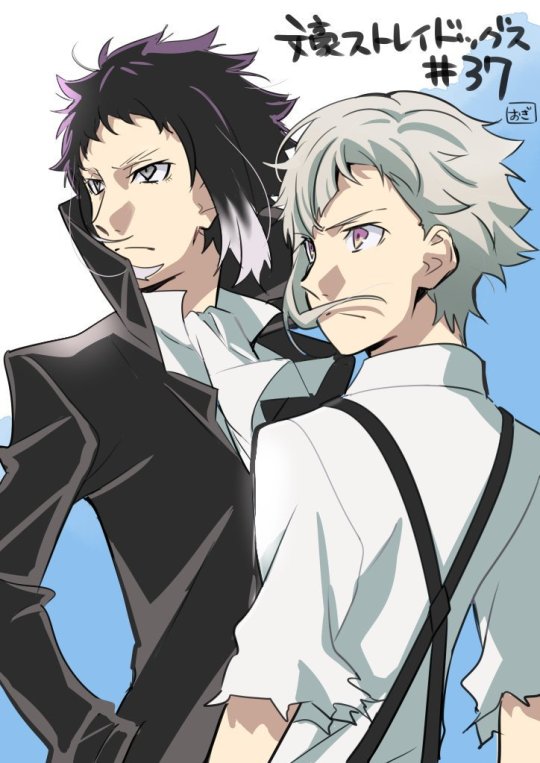
Atsushi is one of the strongest written protagonists encountered in manga. Which means that for as many strengths as he has, he has an equal amount of weaknesses. His biggest weakness is highlighted all the more in his relationship with Akutagawa, and the friction between the two as they bring out the best in each other while also simultaneously seeing the worst in one another. For a deeper analysis of Atsushi and his struggles using his connection to Akutagawa to guide us, read underneath the cut.
Before I start I just wanted to mention [this post] which covers the same kind of topics. Since we’re covering similiar areas I thought it’d be nice to mention them.
One more thing heavy discussion of child abuse below, because we’re analyzing Atsushi’s background.
1. Atsushi as a Victim of Abuse
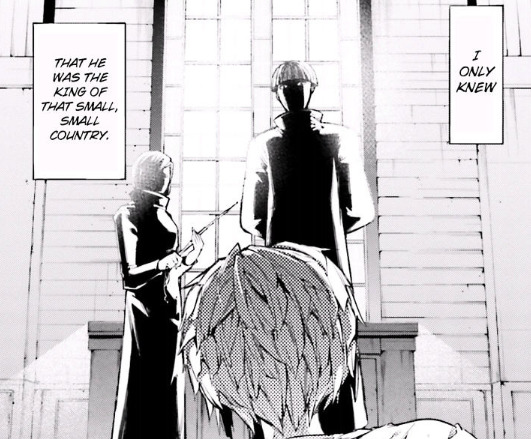
Atsushi grew up in an environment where basically everything about his life was controlled and dictated by the headmaster. He had absolutely no agency, to the point where he is symbolically chained up several times. His living situation was also unstable. The headmaster could stop feeding him at any moment, and even if he told the truth and obeyed he was punished.

In his formative years Atsushi’s life is defined by him trying to survive the instability. Him trying to remain good and avoid punishment in a situation where the goalposts keep changing. Nothing Atsushi could have done would have stopped the headmaster from arbitrarily punishing him.


Of course a child is not going to comprehend this. All Atsushi knew was he was punished over and over again. As if his very existence was a punishable offense. As if he needed to apologize just for being born. We know Atsushi’s response to this constant punishment was to just over, and over again, strive to avoid it by being good and never getting on the headmaster’s bad side.
If I become a good person I won’t be punished. That is the idea that Atsushi internalized. While abilities are just supernatural powers with no clear explanation of their origin it can be read as a metaphor as for Atsushi’s response to the orphanage.
Atsushi repressed, all his anger, all his resentment, his fear, all negative emotions that might make him a bad child who would be punished in order to try to appear good. However, whether he repressed them or not in the first place was meaningless because the headmaster was going to punish him regardless. So, not only is Atsushi repressing, but he’s repressing in response to a broken system that is going to keep punishing him no matter what he does.
However, the sad fact about abuse is that it does not turn you more noble, and more kind. There is no good way to react to abuse. Atsushi buried all of his emotions in order to try to survive, but that does not meant they ever way. All of those negative emotions just escaped in some other way. The anger he had for being punished, his resentment for being singled out, it all was expressed by the tiger who rampaged in the orphanage.
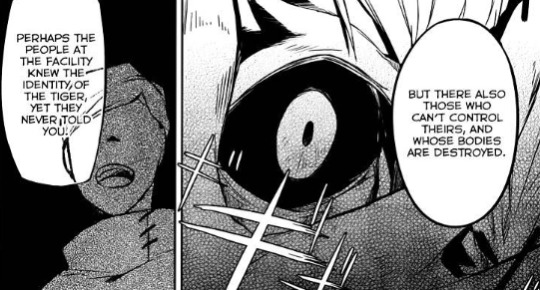
Which adds to another pattern to the environment Atsushi grew up in. He repressed everything to try to appear good, but repeatedly he would lash out with everything he repressed at once. Which meant Atsushi basically had no healthy outlet for his emotions.
Not only that, but Atsushi was also personally targeted and groomed by the headmaster of the orphanage. I use the term groomed, because the headmaster went out of his way to shape and mould Atsushi’s personality with an unhealthy mindset. The headmaster tried to force his own ideas into Atsushi’s head and make him see the world in the same way.
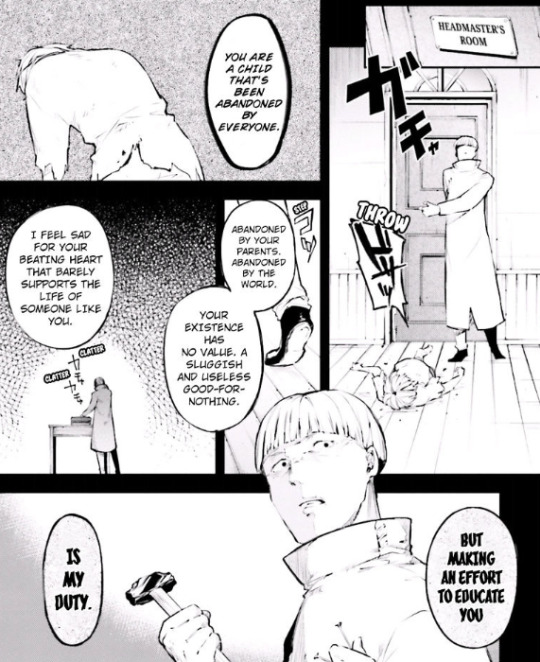
Atsushi is told over and over again by this person who has absolute control over him, and his reality that if he does not learn to endure pain that he will die. That he was abandoned due to some personal defect inside of him that needs to be corrected.


These are all the circumstances which can cause a clear Abandonment Complex to develop.
Healthy human development requires needs for physical and emotional care to be met. Unmet needs can result in feelings of abandonment. Experiencing abandonment can become a traumatic life event. The death of a parent can be a traumatic event for a child. Feeling unsafe due to a threatening situation like abuse or poverty can also cause trauma.
Some degree of abandonment fear can be normal. But when fear of abandonment is severe and frequent, it can cause trouble. It may impact how a person’s relationships develop. When this is the case, the support of a therapist or counselor may help.
Both Atsushi’s physical and emotional needs were never met. We know he was starved often, and constantly alone without a single other person who he could talk to in this situation. Which meant the orphanage manager had absolute control over his reality and basically no one to disagree with the way he dictated things to Atsushi. Of course Atsushi would come to accept the Director’s warped view as truth.

Not only that, but he was already traumatized by having no memory of who his parents were or why he was abandoned, but he was re-traumatized over and over again with the headmaster blaming him personally for his own abandonment. He was abandoned because he was a bad child. He was constantly unsafe due to constant threats of harm.
Even the action he took with supposedly “”””good”””” intentions was an incredibly damaging one. The headmaster once again forced his black and white viewpoints of the world onto an unwilling child. The final lesson the headmaster gives Atsushi is that the world is full of evil people, that he will be abandoned, and if not abandoned he’ll be killed if he’s not good enough.
Not only is the orphanage an unstable place of constant risk of harm, but Atsushi comes to see the outside world that way as well. Not only that, but there are countless faceless people who will hurt him far worse than his previous abuser.

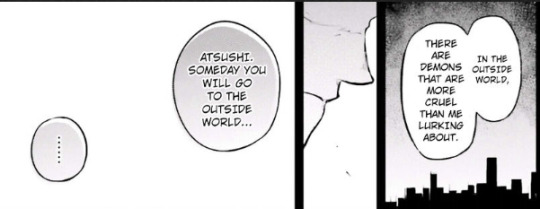
His last action is to completely abandon Atsushi, one day with no warning or explanation. Something which Atsushi was so poorly prepared for he literally was on the brink of starving to death.
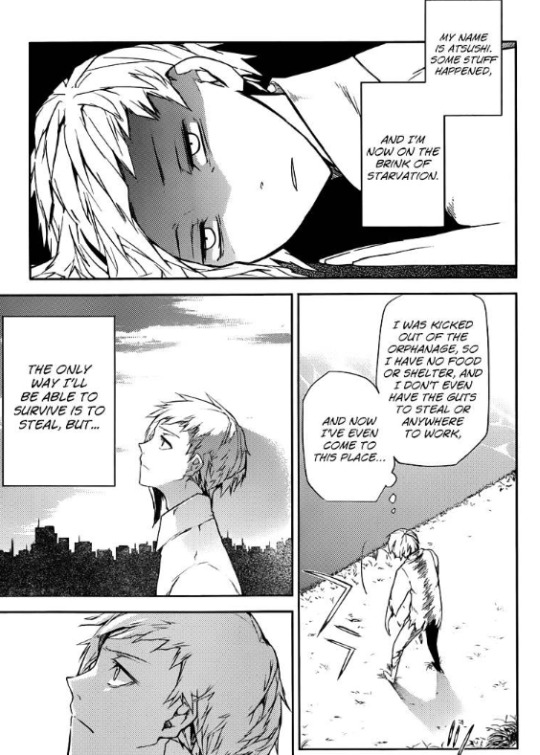
Not only did Atsushi nearly die from this alone, but this also quite literally confirms what Atsushi was told to fear over and over again all these years. That one day he is going to be abandoned unless he gives other people a reason to keep him around. That he has no value of his own and can be easily thrown away at any moment without warning. Not only did none of the headmaster’s actions prepare him for the outside world at all, but they also taught him to constantly fear others, and be insecure of his place around them because of how easily a worthless child like him could be abandoned all over again.
2. Atsushi and the After Effects of Abuse
His upbringing has had several severe effects on Atsushi’s mindset that he cannot shake off easily. Arguably, I would say that Atsushi in the end accepted the headmaster’s values as his own. He started to see the world in the same way as the headmaster did, but that’s not because Atsushi is a bad person like the headmaster but rather the headmaster had absolute control of him and his environment with a king and tried to mould him in a certain way with no other people around Atsushi to validate Atsushi’s own viewpoint of the world.
Eventually, in a way Atsushi came to accept what the headmaster said as truth. Which is a paradox, as Atsushi knows that the Headmaster was a bad person who tortured him and one he loathes more than anything, and yet he lets the headmaster’s words guide all of his actions.
This is shown in the manga by the frequent flashbacks to the headmaster during times of stress. While flashbacks can also be symptoms of PTSD (ie, in an environment that Atsushi had to adapt to to survive, he is unadjusted to normal life and therefore keeps believing himself to be in that environment), it’s also a visual metaphor for showing that even having escaped the Headmaster, the Headmaster’s words still are primarily what guide Atsushi’s sense of morality.
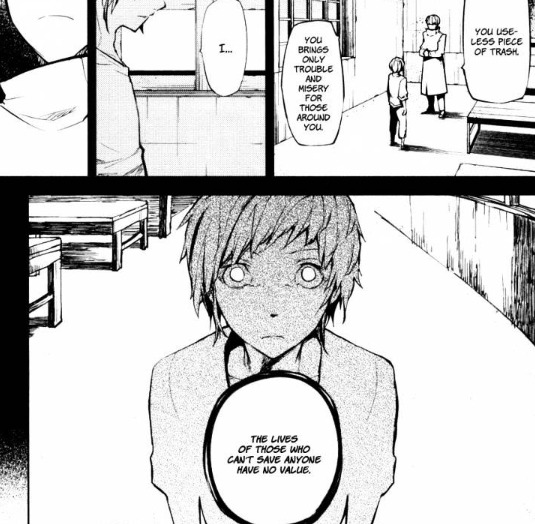
Insecure Attachment is a way to describe Atsushi’s attachment to everyone around him. Developing as a person and being able to maintain healthy relationships requires growing up in a healthy environment. Atsushi had no formative attachments when he was going up. Not only that, but he was constantly blamed for that fact, that he was the reason that he was alone.
When a child develops a secure attachment, it presents as a healthy bond. In other words, they learn to expect the best from the other person and believe that they have a good heart. In people with insecure attachment, however, the expectation is the complete opposite. They expect the other person to abandon them or harm them in some way.
Even if Atsushi is outside of the orphanage and in a much healthier environment of the detective agency, he still shows insecure attachment in almost all of his relationships. It does not matter how close he becomes to the people around him, the experiences from his childhood still define all his relationships.
Atsushi constantly expects the others around him to abandon him. No matter how many lives he saves, he still carries this expectation around with him. While his desire to save people is a good one, it comes from an extremely unhealthy place.
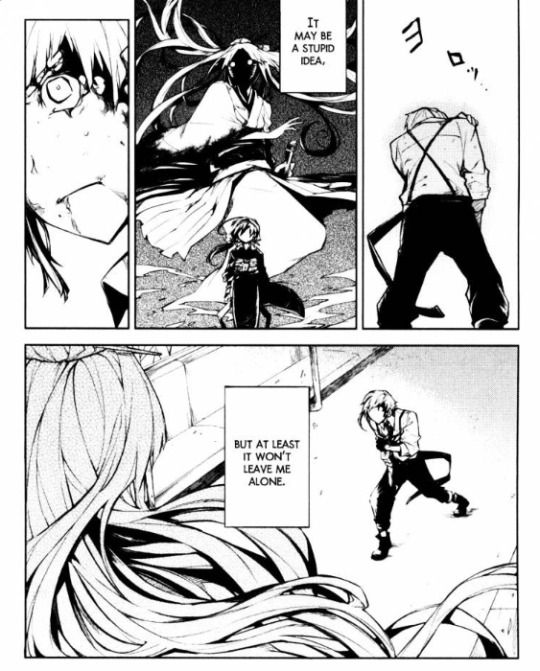
Atsushi intentionally puts himself in reckless and dangerous situations, not only because he believes it to be the right thing to do. I would say Atsushi has a very loose definition of right and wrong because he still is much like a child that does not know much about the world and its nuances. The standards by which Atsushi judges everything is “Will I get abandoned or not?” If he’s not alone at the sum end of all of his actions then it’s a good thing.
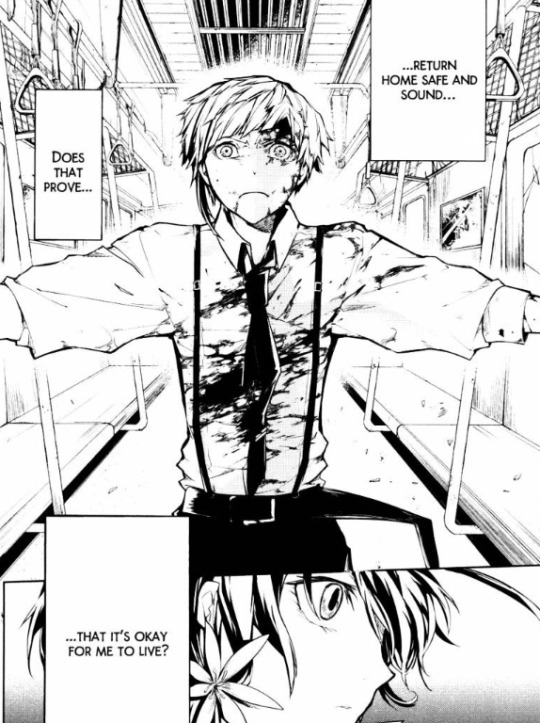
However, this is fundamentally unhealthy behavior. Atsushi is seeking external validation that he’s basically never going to get. Not only that but his way of seeking it, is a form of indirect self harm. This system presents itself in a complex way, so a brief diversion. One of the traumatic events we are shown in flashback is Atsushi being told to punish himself, and then when he lacks the ability to punish himself the headmaster punishes him anyway.

Atsushi was raised to believe his existence is wrong and he should be punished for it, but he cannot bring himself to directly self harm so he always seeks it out in indirect way. It’s not a coincidence that Atsushi’s ability besides turning into a tiger is also healing.

Atushi immediately flashes back to his headmaster telling him that he is not allowed to express his own pain in any way. Therefore, he is not worthy of feeling pain.

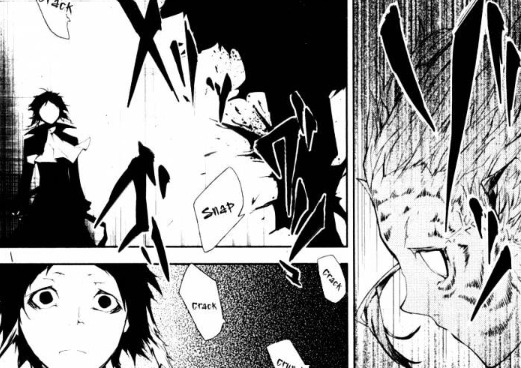
Then Atsushi conveniently regenerates his entire leg. Atsushi who has been raised in constant harms, now has a method where he can be hurt over and over again, and constantly heal himself. Atsushi shrugs off grievious injuries like they are nothing, and his way of fighting has always been to push himself to his absolute limit and abuse his healing factor.
In other words because Atsushi believes he is not allowed to cry, or feel pain, and therefore his emotions are less worthy than those in danger, we see a pattern of behavior where he seeks out danger. He intentionally puts himself in harm’s way in an effort to prove himself. While this is also him genuinely wanting to help others, it also comes from a place of low self esteem, and no regard for himself. People who are raised in healthy environments do not immediately leap at any chance to put themselves in danger like this, or tank horrible injuries without much thought.
Atsushi is a genuinely selfless person who wants to grow into a good person who protects the weak, but he is also so self depreciating that it manifests in self harming behavior. Both of these things can be true at once, they are what give him complexity as a character.
3. Atsushi and Akutagawa’s Weakness
Atsushi has an incredibly complicated relationship with how he perceives violence. As a survivor of constant physical punishment, who was told he was being punished by a bad person who uses their strength to hurt the weak part of Atsushi loathes violence. Not just loathing, but he feels an internal disgust. His worst fear possible, is growing into the kind of person that hurts others.
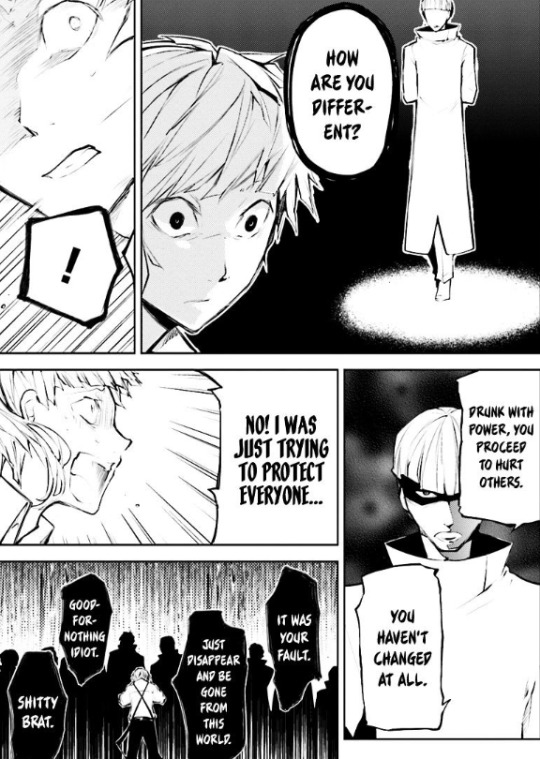
Not only does Atsushi believe that he’s worthless, he also believes he’s a fundamentally harmful person. That if he does not fight to protect, and control his violence that he will bring harm to everyone around him. Therefore he will be the kind of bad person that the Head Master was. The kind he was conditioned to hate and told the world was full of.
This is why both the tiger manifests, and also Atsushi loathes the tiger. As I said above, the tiger represents what Atsushi represses about himself. That he hated the people who hurt him, that he wanted to defend himself, that he wanted to survive even if it meant getting violent. He represses all of this to appear as a wholly good person who would never harm another and only fight to protect others. When the tiger rampages, that which Atsushi represses comes out.

Atsushi uses violence too. He is someone who is fundamentally fighting to survive. However, he does not want to see himself as a violent person. Even though he needs to use that strength inside of him to protect others. It’s a paradox that Atsushi ignores and represses. A shadow that he ignores.
This is something that causes Atsushi’s view of the world to become fundamentally black and white (like a tiger’s stripes), and also like the man who raised him. There is “Acceptable, good violence” that he does not have to feel guilt over and then there is “Unacceptable, bad violence” which he loathes himself for and proves that he’s a fundamentally dangerous person like the orphanage told him he was.
So Atsushi is not so much striving to be a non-violent person, so much as only being violent in ways that he personally sees as acceptable. Which is why Atsushi who seems too terrified of offending everyone, too nice for his own good, like a walking doormat that others walk over and too nervous to ever speak up for his own sake, becomes far more confrontational and aggressive when fighting against an enemy. It’s natural to become defensive, aggressive in the environment that he was raised in. However, Atsushi does not want to acknowledge these aspects because they do not fit his black and white view of what a good person is.
To define what is acceptable violence, Atsushi must first define what unacceptable violence is. This is where his relationship with Akutagawa comes to play.


The first thing Akutagawa does upon meeting Atsushi is trigger his memories of the past, by confirming the world view he’s been instilled with that he brings harm to everyone around him. Every time Atsushi messes up and hurts someone, he also flashes back to Akutagawa’s accusation.

Atsushi sees Aktugawa as “someone bad” like the headmaster. Someone who exists to punish the weak with his strength. However, that viewpoint does not come from Atsushi understanding Akutagawa, so much as a projection inside his own head. Atsushi projects all the fears that he fears having onto Akutagawa. This is to externally prove that Atsushi is not a violent person, and therefore a good person.

Atsushi may be stuck in a situation of trying to permanently earn the approval of everyone around him, but as long as he does not end up as someone like Akutagawa that’s all fine. Akutagawa is someone worse than him, and by seeing him that way Atsushi can uplift himself.
The reason that Akutagawa is Atsushi’s greatest weakness, is because Akutagawa disproves the flaws in the narrative that Atsushi tells himself. That if he works continuously to save others he will be a good boy. Akutagawa confronts Atsushi with the unavoidable relaity of his situation, that causes Atsushi’s perceptions to crumble.

Atsushi believes he’s prospering, but the way that he is continually working himself to the bone for the sake of others, he’s actually just treading water. Akutagawa introduces complexity to a world that Atsushi does not want to face yet. That things are not quite as black and white as Atsushi seems them as.
While Akutagawa is in fact a murderer, and violent, the fact does not change that he is also someone struggling to survive just like Atsushi is. Atsushi does not want to acknowledge that struggle because it means facing his own struggle, which is overwhelming for him. While Atsushi has every right to morally object to Akutagawa killing people, it also comes from a personal grudge and very biased viewpoints. Akutagawa kills because he believes he’ll be thrown out and deemed worthless otherwise (whoa just like Atsushi). Dazai killed because he wanted to find meaning in life. Kyouka killed as revenge against the world that killed her parents in a traumatizing event robbing her of the will to live.
All of these are so called “bad” reasons to kill other people, but Atsushi does not really care all that much that Kyouka and Dazai are both former murderers with high bodycounts. He only sees the good in them while ignoring the bad.
Atsushi also has every right to hate Akutagawa for his treatment of Kyouka. Yet, at the same time Atsushi ignores any moral complexity in Dazai’s character. He basically does not acknowledge the way Dazai treated Akutagawa, or abandoned him, even though being abandoned is what Atsushi fears the most.

Akutagawa and Atsushi are both victims of violent abuse, and then being abandoned by their abuser after they did everything they could think of to please him. They’re both trying to measure up to what are shifting goal posts and changing standards. Akutagawa even makes this comparison himself.
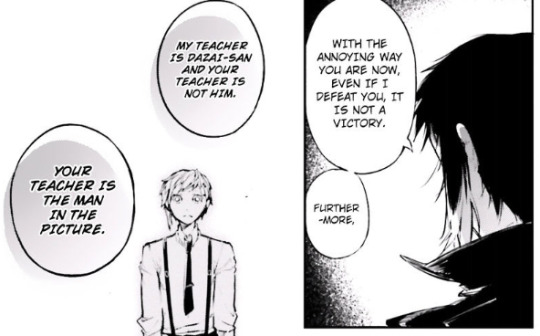
Atsushi’s primary response is always to repress however, therefore he ignores the connections to Akutagawa and himself. He does not want to acknowledge Akutagawa as a human being, because that would also require Atsushi acknowledging himself as a human being, and to Atsushi that is impossible as of right now. He still sees himself as a stray dog, as a man tiger. Atsushi has not reached the point of self actualization where he realizes he is no longer the orphan suffering from the threat of constant abandonment and has moved onto a safer situation.
Atsushi sees Akutagawa as a strong person just bullying others, because of his lacking self awareness. He fails to realize that Akutagawa is someone as insecure about his own existence as he is. He is also someone constantly fighting to survive in a violent and indifferent world.

Akutagawa is an orphan too. Just like Atsushi, just like Kyouka, but Atsushi does not want to acknowledge it. (Once again Akutagawa does plenty to provoke Atsushi too, and tries to tear Atsushi down because he’s envious of his fortune and stability in life but once again this is a meta about Atsushi). It’s because Akutagawa is a bad orphan, and Atsushi was taught that bad orphans should be punished.
The end result is, due to the fact that Atsushi represses whereas Akutagawa wears his violence and emotions on his sleeve (like... some kind of black jacket) Akutagawa at least is far more perceptive of nuance that Atsushi is. While they both notice these things about each other, by the time of cannibalism it’s Akutagawa who notices these underlying behaviors in Atsushi. Almost as if he is trying to understand him. (This is also coupled with Akutagawa lashing out violently, which means he has not shaken that bad habit yet, while Atsushi has not shaken repression and avoidance).

Whereas we also see signs of Atsushi refusing to cooperate with Akutagawa. They both provoke each other, but the fact is that Atsushi is willing to go down to Akutagawa’s level pretty fast, and that comes from seeing Akutagawa as an acceptable target of violence.
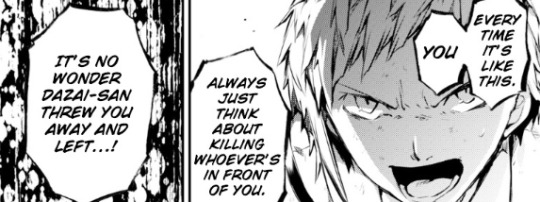
Telling him that he deserved to get abandoned because he’s not good enough, is exactly what the headmaster told him over and over again. It’s Atsushi’s greatest fear, being a bad person, and being abandoned. It’s not just bickering, it’s targeted lashing out on someone who Atsushi thinks is okay to lash out in this manner.

Not only that but, even after noticing that Akutagawa has been triggered by something that Atsushi knows is related to his own sense of trauma, we see Atsushi deliberately trigger him again a second time.
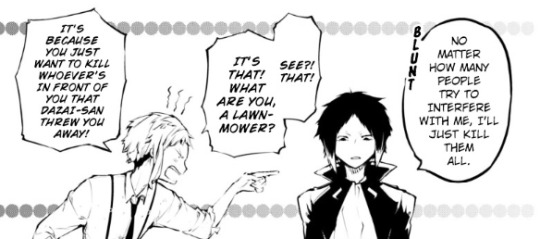
That’s not to say Atsushi is a bad person, he’s a person reacting to abuse. The point of the comparison to Atsushi and Akutagawa is that there’s no good way to react to abuse, and hanging onto the notion that there is is something that ultimately hurts Atsushi and causes conflict with him in the end.
The fact that he’s still trying to save others in order to prove himself, shows that Atsushi’s greatest weakness is that he’s not willing to let go of an unhealthy mindset. As long as he cannot accept Akutagawa, he also cannot accept himself. What Atsushi needs is to see himself as a human being, not a hero who exists only to save others. Atsushi associates Akutagawa with the headmaster, but that’s an incorrect association.

Akutagawa is just as human as he is. Nothing good will come from one orphan beating up another orphan. They need to realize that they are both suffering and reach out a hand to save each other, not try to destroy each other. That’s as good as self destruction.
#atsushi nakajima#ryunosuke akutagawa#atsushi meta#akutagawa meta#bsd meta#meta#bungou stray dogs meta#shin soukoku#shin soukoku meta#ssk meta#ssk
628 notes
·
View notes
Text
I Learned to Discern Between the True Christ and False Christs and Welcomed the Return of Jesus (Part 2)
By Xiangwang, Malaysia
Brother Zhang continued his fellowship, saying, “God is the truth, the way and the life, and besides discerning between the true Christ and false Christs by the principles of God’s work, we can also discern them by the essence of Christ.” At that point, Brother Zhang sent over a passage of God’s words: “God become flesh is called Christ, and so the Christ that can give people the truth is called God. There is nothing excessive about this, for He possesses the substance of God, and possesses God’s disposition, and wisdom in His work, that are unattainable by man. Those who call themselves Christ, yet cannot do the work of God, are frauds. The real Christ is not merely the manifestation of God on earth, but also the particular flesh assumed by God as He carries out and completes His work among man. This flesh is not one that can be replaced by just any man, but one that can adequately bear God’s work on earth, and express the disposition of God, and well represent God, and provide man with life. Sooner or later, those who impersonate Christ will all fall, for although they claim to be Christ, they possess none of the substance of Christ. And so I say that the authenticity of Christ cannot be defined by man, but is answered and decided by God Himself” (“Only Christ of the Last Days Can Give Man the Way of Eternal Life” in The Word Appears in the Flesh).

Brother Zhang went on with his fellowship, saying, “We can see from God’s words that Christ is the incarnation of the Spirit of God—He possesses a divine essence, He performs the work of God, He expresses the disposition of God, He can express the truth to supply and shepherd man at any time and in any place, and only Christ can perform the work of saving man. The Lord Jesus was Christ, for example, and His appearance and work brought the Age of Law to a close and began the Age of Grace. He also spoke His words to give mankind the way of repentance, to enable us to know clearly God’s will and requirements and so that we would have a way to follow when difficulties arise. Through the words of the Lord Jesus, man understood how to pray to the Lord, how to get along with one another, how to forgive each other, and so on. Moreover, the Lord Jesus expressed His disposition of lovingkindness and mercy, He healed the sick, cast out demons and He bestowed endless grace on man. Ultimately, He was crucified in order to redeem mankind, thus completing the work to redeem all mankind and saving us from the bonds and fetters of the law, as well as sparing us from the danger of being condemned and put to death for violating the law. These are just some of the things the Lord Jesus did, and no one else could have done them in His stead. From the work and words of the Lord Jesus, we can see that He is the truth, the way and the life. Similarly, God has once again become flesh in the last days and He has ended the Age of Grace and begun the Age of Kingdom. He has uttered millions of words, He performs the work of judgment and purification, and He expresses the righteous disposition of God that is majestic, wrathful and inviolable. The words spoken by Almighty God not only unveil the mystery of God’s entire management plan and the end and final destination of man, but they also expound in perfect clarity the truths we need to be purified and to attain true salvation. For example, how Satan corrupts man, the truth of man’s corruption at the hands of Satan, how God judges and purifies man’s corrupt dispositions, how man should believe in God and obey God, what kind of person God loves and what kind of person He detests and weeds out, and how we should pursue in order to be made perfect by God, and so on. Through experiencing the judgment and chastisement of God’s words, we see clearly the essence and root of our corruption by Satan and we come to understand God’s righteous, holy and inviolable disposition. We then cannot help but fall to the ground before God in true remorse, we become more and more reverential and obedient toward God and, gradually, we cast off our satanic corrupt dispositions, free ourselves from the bonds of sin and achieve the true salvation of God. The utterances and work of Almighty God bring us the truth, the way and the life—Almighty God is God Himself and He is Christ become flesh. False Christs do not possess the essence of God and they cannot express the truth, much less perform the work of saving mankind. They can only say some things that may sound true but are actually false in order to deceive and harm people. When someone listens to them, they not only obtain no supply whatsoever, but furthermore their hearts become darker and darker, their hearts sink lower and lower, they have nowhere to turn to, and they inevitably end up being devoured by Satan. Therefore, we are able to ascertain from God’s utterances, work and the disposition He expresses that only Christ is the truth, the way and the life.”
After listening to the words of Almighty God and the brother’s fellowship, I came to understand completely the truth of how to discern between the true Christ and false Christs. “Yes,” I thought. “Only Christ is the truth, the way and the life, and only Christ can express the truth and perform the work of God Himself. All who name themselves Christ but who are incapable of expressing the truth and who cannot perform the work of saving man are false Christs. I’ve now found the way forward and I’m no longer afraid of being deceived by false Christs and constantly being passive and guarded. Thanks be to God!”
Over the time that followed, Brother Zhang gave me fellowship on other truths, such as the mystery of the incarnation, the difference between God’s work and the work of man, the inside story on the Bible, and more. The more I listened, the more satiated I felt, and I looked forward every day to attending gatherings with the brothers and sisters. Each time a gathering ended, I would discuss with my mom the things that had been newly illuminated to us and, slowly, I came to have some understanding of God’s work of the last days. Over a period of seeking and investigating, I became certain that Almighty God was indeed the Lord Jesus returned. I then began to spread the gospel and to tell the news of the Lord’s return to even more people who longed for the appearance of God.
The Wicked Servants Show Their True Colors
Later, my mom and I went to our old church to attend Friday worship. After the assembly was over, to our surprise, the pastor began to play a video that laid false charges against The Church of Almighty God. When I saw the fabricated rumors and the slander they’d leveled against The Church of Almighty God, I became angry, and I thought: “The Church of Almighty God is nothing like they say at all. They have never had anything to do with The Church of Almighty God and neither have they investigated God’s work of the last days. How can they so baselessly and arbitrarily judge the work of God?”
After the video was over, the pastor, two deacons and two church council members asked my mom and I to stay behind. The pastor asked us, “Are you two now believers in Almighty God?” We replied, “Yes.”
The moment we said this, one of the deacons suddenly sprang to his feet and, pointing at my mom, said ferociously, “So you now believe in Almighty God? From tomorrow, you are no longer permitted to teach Sunday school. Tomorrow afternoon, I’ll come to your home and take back the church’s money.”
My mom said, “You can take it whenever you like.”
The pastor asked angrily, “The entire religious world resists and condemns The Church of Almighty God. Why would you persist in having contact with them?”
My mom retorted, saying, “Pastor, does the religious world possess the truth? Did the Lord Jesus ever say that one can only welcome Him by following the religious world? When the Lord Jesus appeared and performed His work all those years ago, the Jewish leaders not only refused to seek or investigate His work themselves, but they also stopped believers from accepting it, and they even made up rumors about Jesus and they frantically resisted, judged and blasphemed against Him. In the end, they offended God’s disposition and were thus cursed and punished by God. If we go by what you say and say that any way the religious world resists and condemns is not the true way, then would that not mean that you are denying even the work of the Lord Jesus? You go along with the religious world in your resistance to and condemnation of The Church of Almighty God, and you refuse to seek or investigate God’s work of the last days—does this accord with the truth? As the pastor and deacons of the church, why do you just arbitrarily condemn and judge Almighty God’s work of the last days without even bothering to look into it? Through reading many of Almighty God’s words, by seeing that Almighty God’s words are the truth and that they are the voice of God, we have become certain that Almighty God is the Lord Jesus returned.” To my surprise, they showed a contemptuous disregard for what my mom had said, and they didn’t accept it at all.
My mom opened an app on her phone and read Almighty God’s words to them. One of the church council members then spoke very arrogantly and said some blasphemous things against Almighty God. My mom said angrily, “You are so unbelievably arrogant. These words are the truth—can you not hear it? Can you understand the voice of God when you hear it? Are you God’s sheep?”
They smiled mirthlessly and just looked haughtily at us. The pastor then said self-importantly, “The One we wait for is the Lord Jesus who has nail wounds in His hands and who comes with the appearance of a Jew. Apart from the Lord Jesus, we won’t accept anything, even if what Almighty God expresses is the truth.” Seeing how stubborn they were being, my mom and I gave up trying to talk to them. I saw that their behavior was exactly the same as that of the Pharisees who had resisted the Lord Jesus; they believed in God but they didn’t seek the truth, nor did they take heed to listen to God’s voice. Instead, they were just arrogant and conceited, they stubbornly clung to their own notions and imaginings and they arbitrarily judged and resisted God’s work—they were indeed the ones who appeared to serve God but who actually resisted Him.
The pastor then threatened us, saying, “We’ll give you one month to reconsider. If you’re still persisting in believing in Almighty God in a month’s time, I’ll expel you from our church.”
I said indignantly, “No need to wait a month. Just expel us now. Having spent this time seeking and investigating God’s work of the last days, we’re already certain that Almighty God is the Lord Jesus returned. We have finally heard God’s voice, so even if you don’t expel us, we won’t be coming back to attend assemblies in this church anyway.”
The pastor lowered his voice and said slyly, “That won’t do. If we expel you now, what will the brothers and sisters think of us? They’ll say that we expelled you just for attending some gatherings online, and then we’ll look totally heartless. In a month’s time, we’ll tell the brothers and sisters in our church that we’ve gone to great lengths to counsel you and have given you more than enough time to reconsider, but in the end you persisted in believing in Almighty God and decided to leave the church, and only then did we expel you.”
Hearing the pastor say this, I felt disgusted, and I didn’t want to say one more word to them. I then started to walk out, pulling my mom along with me. Just as we were leaving, the pastor gave us a warning: “It’s up to you whether you believe in Almighty God or not, but I won’t allow you to have any contact with the brothers and sisters in our church.”
When we left the church, it was already past one in the morning. As I thought back over what had just happened, I just couldn’t believe that the pastor, the preacher who we’d respected so much as being so virtuous and moral, could be like that. Just then, God’s words came to mind: “Those who read the Bible in grand churches recite the Bible every day, yet not one understands the purpose of God’s work. Not one is able to know God; moreover, not one is in accord with the heart of God. They are all worthless, vile men, each standing on high to teach God. Though they brandish the name of God, they willfully oppose Him. Though they label themselves believers of God, they are ones who eat the flesh and drink the blood of man. All such men are devils who devour the soul of man, head demons who purposefully disturb those who try to step onto the right path, and stumbling blocks that impede the path of those who seek God. Though they are of ‘robust flesh,’ how are their followers to know that they are antichrists who lead man in opposition to God? How are they to know that they are living devils who specially seek souls to devour?” (“All Who Do Not Know God Are Those Who Oppose God” in The Word Appears in the Flesh).
I’d always thought that the pastors and elders were servants of the Lord and that they should have the most understanding of the Bible and be people who most accorded with God’s will. I’d always thought that, when the Lord returned, they would definitely be able to welcome the Lord. Never had I imagined that, when the pastor heard the news of the Lord’s return, not only would he not seek or investigate it, but he would also become so arrogant and self-important, stubbornly clinging to his notions and imaginings, and that he would judge and condemn both God and God’s work of the last days. He was completely without a God-fearing heart, so much so that he would even pretend to be “protecting the flock” and would obstruct and stop believers from investigating God’s work of the last days, just for the sake of maintaining his own status and livelihood. To those believers who did accept God’s work of the last days, the pastors and elders resorted to expulsion to threaten, and intimidate them and even make the other brothers and sisters in their church reject them so that they wouldn’t be able to preach the gospel to their brothers and sisters. They were so sinister and malicious! In order to maintain their positions and livelihoods, the Pharisees at the time of Jesus wildly resisted and condemned the Lord and they crucified Him upon the cross. The pastors and elders of today have exactly the same essence as the Pharisees—they are the antichrists who have been exposed by God’s work of the last days, and they are the demons who devour the souls of man. At that moment, I finally understood completely that when someone believes in God but doesn’t know God and doesn’t know God’s work, then no matter how much they appear to suffer or how much they appear to expend themselves, they just always resist God and offend God’s disposition by relying on their arrogant and conceited satanic disposition.
At that moment, I couldn’t help but express thanks and praise to God in my heart. Thinking back, I had been deceived by the hypocritical appearance of the pastors and elders and had always idolized them, followed and obeyed them, and in the matter of welcoming the Lord, I had even gone along with them and resisted God. God exposing them for what they were allowed me to see, at last, the truth-hating, God-hating demonic essence of the pastors and elders, and I was then able to pass through the trap they had laid for my soul and welcome the return of the Lord. I truly give thanks to God for saving me, and I wish to pursue the truth in earnest on the path ahead of my faith in God so that I may repay God’s love!
Recommended : 4 Principles on How to Be Closer to God
0 notes